It may be the most instantly gratifying pleasure known to humankind: That first cold, refreshing sip of your favorite beverage on a hot day. And when the weather turns cold? A beverage is still the fastest way to warm up the chill and turn your mood around. But as you get older, there are some drinks that once you're over the age of 40, it's best to steer clear of.
See, while a drink may be the fastest way to quench your thirst or comfort a chill, it's also the fastest way to expand your waistline. Liquid calories account for a whopping 22% of our daily calorie intake—upwards of 350 calories every single day, which is more than twice as much as we drank 30 years ago.
You may not realize how many calories you're consuming through drinks, but that doesn't mean they aren't making an impact on your body weight. Researchers from Harvard University and Children's Hospital in Boston found that women who increased their intake of sugar-sweetened beverages, like soda, from one per week to one or more per day added 358 calories daily and gained significant weight over the course of 8 years.
Simply cutting your drink calories in half could mean shaving off more than 18 pounds in just one year—an important statistic, because losing weight becomes harder after age 40.
Flavored Coconut Water
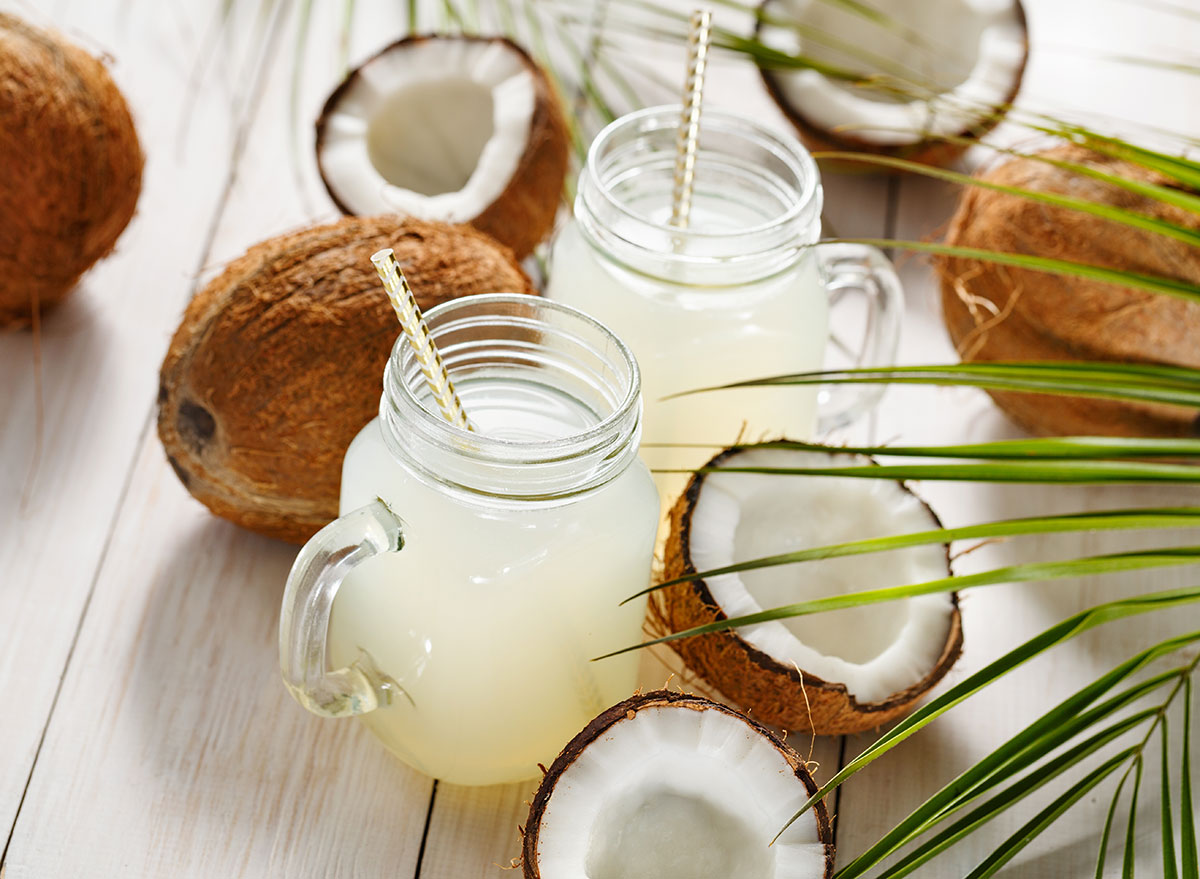
Plain coconut water is a wonderful electrolyte replenisher, but once companies throw in added sweeteners and tropical fruit-flavored syrups (think pineapple coconut water), you often end up drinking more sugar than is in an actual coconut.
Lemonade

For many of us, lemonade evokes memories of cute kids sitting at a stand the end of their driveway. And while the littles pushing the drink may be innocent enough, the beverage itself is not, as it can be high in calories and sugar in just one cup. The only thing we like about this drink is its fairly harmless list of ingredients. While water, sugar, and lemon juice won't make you sick, drinking it in excess could bring on a metabolic condition that will. And don't even think about going for the Minute Maid stuff, as that version has a whopping 40 grams of sugar in just one 12-ounce can.
Drinkable Yogurts
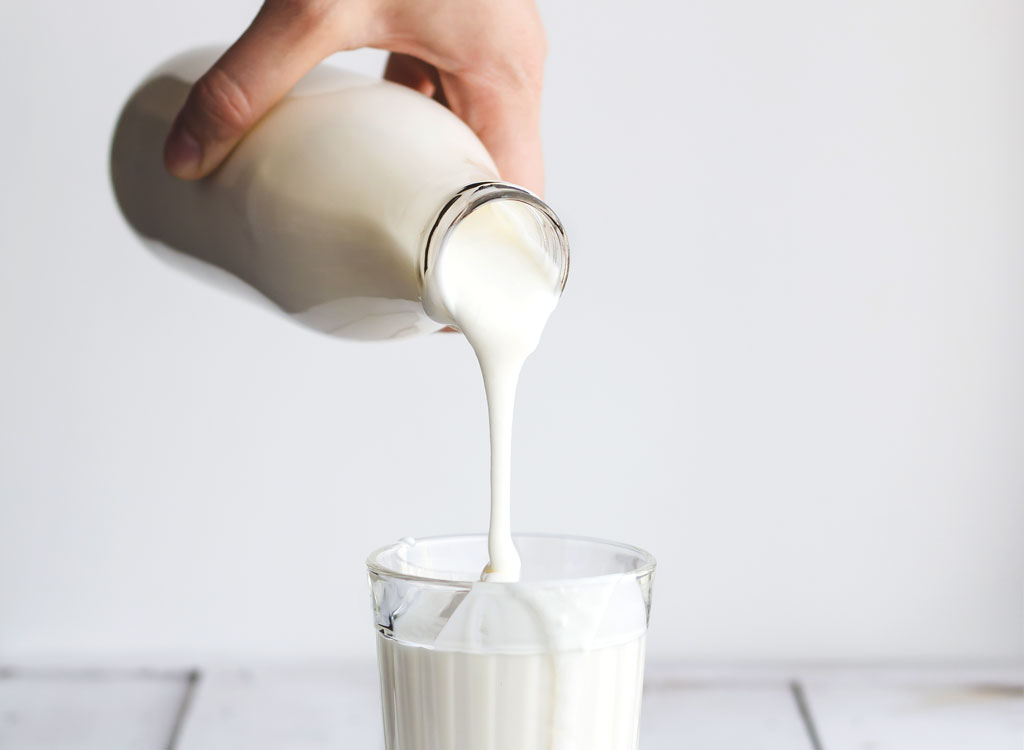
Probiotics are great for maintaining good gut health, but not when they're tainted with loads of sugar. Take Bolthouse Farms' Peach Parfait Breakfast Smoothie as an example: just one 15.2-fl-oz bottle packs in 360 calories and 45 grams of sugar.
Pumpkin Spice Lattes
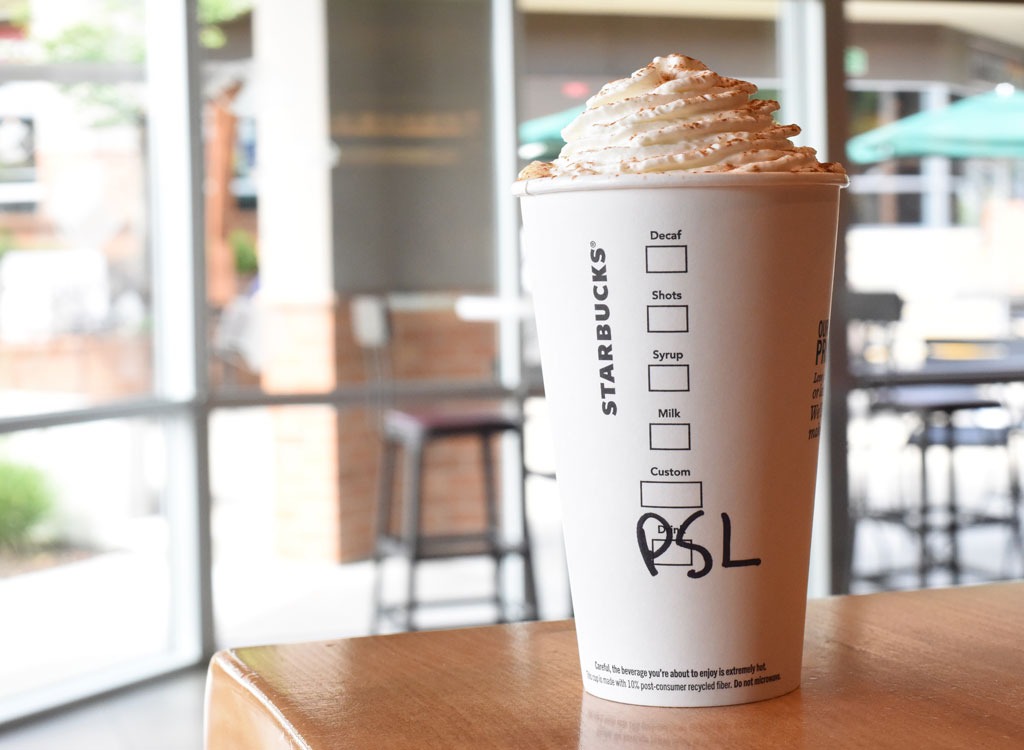
We know how difficult it can be to resist a classic, comforting PSL, but passing up the pumpkin-flavored bev will do wonders for your waistline. If you order a tall PSL from Starbucks with 2% milk and no whipped cream—a choice that seems slim to most—you're still ingesting 300 calories and a whopping 39 grams of sugar. If you really need a caffeine fix, stick to black coffee with a splash of cream and limit your seasonal latte indulgences to once or twice a month.
Tonic Water
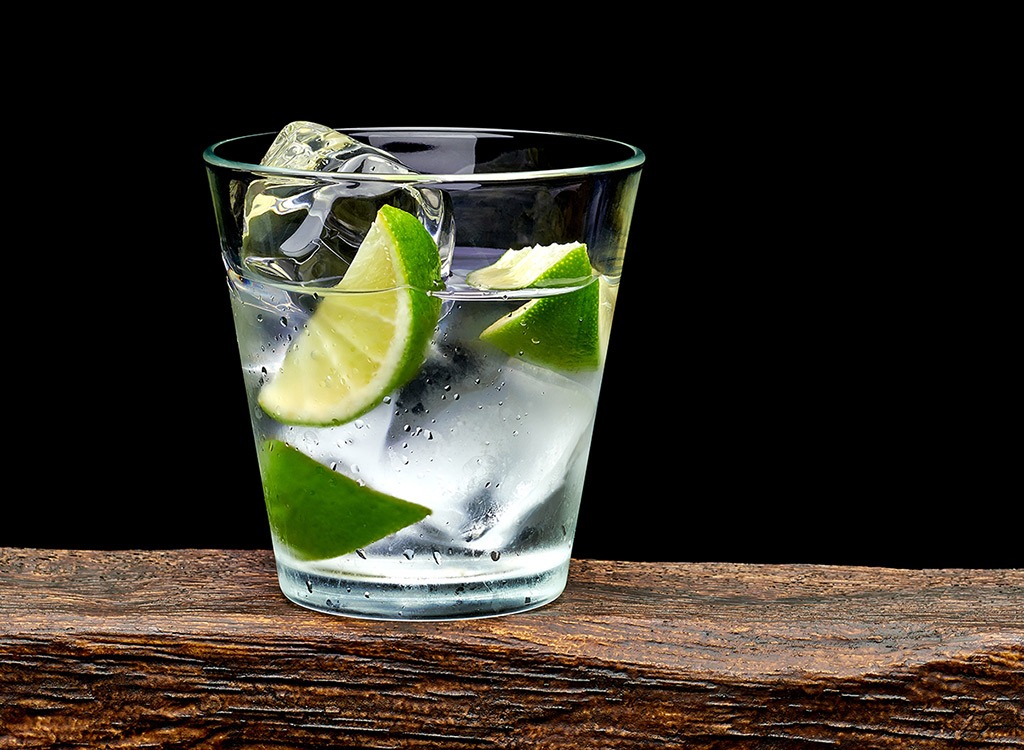
If you order a gin and tonic at the bar thinking the clear mixer is better for your belly than dark sodas, think again. Just 12 ounces of tonic water can cost you 124 calories and 32 grams of sugar—that's only seven grams less than soda for the same amount!
Root Beer Floats
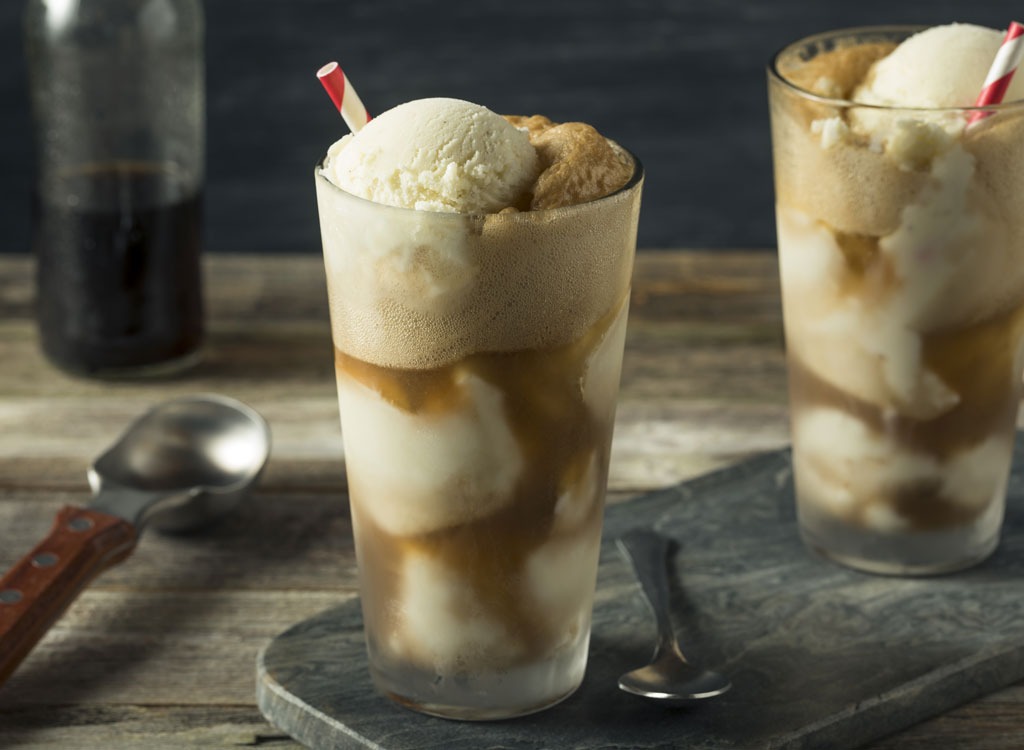
Since when did a blend of ice cream and root beer ever sound like a good idea? Maybe as a kid, but not as a health-conscious adult. If you must relive your childhood from time to time, make sure to share the creamy float with a friend!
Lime-A-Ritas
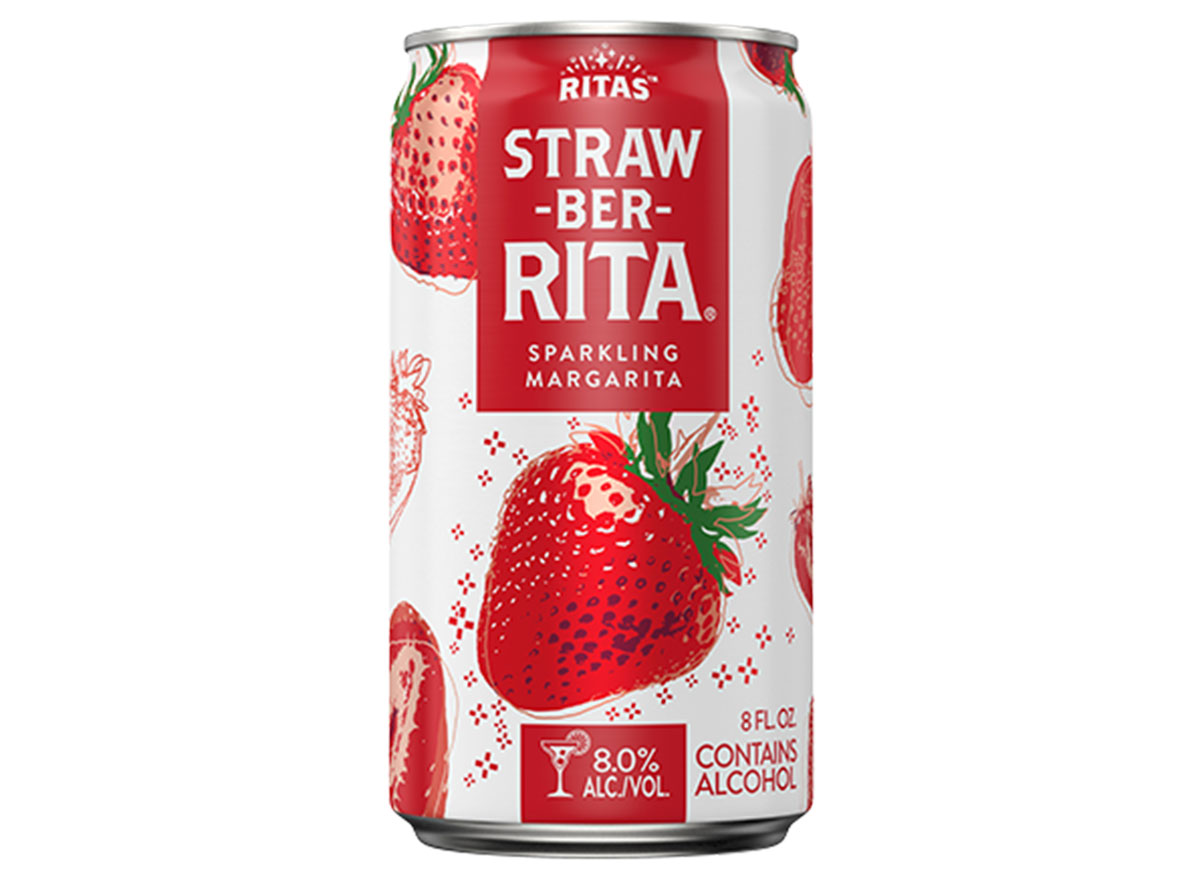
Mixing your liquors is never a good idea, especially if it's in Lime-A-Rita form. Bud Light packs nearly 200 calories into a small eight-ounce can, and the sweet concoction is made with artificial sweetener and artificial flavors. Make your own refreshing (and way less caloric) marg with fresh lime juice, a teaspoon of honey, triple sec, and tequila.
Laxative Teas
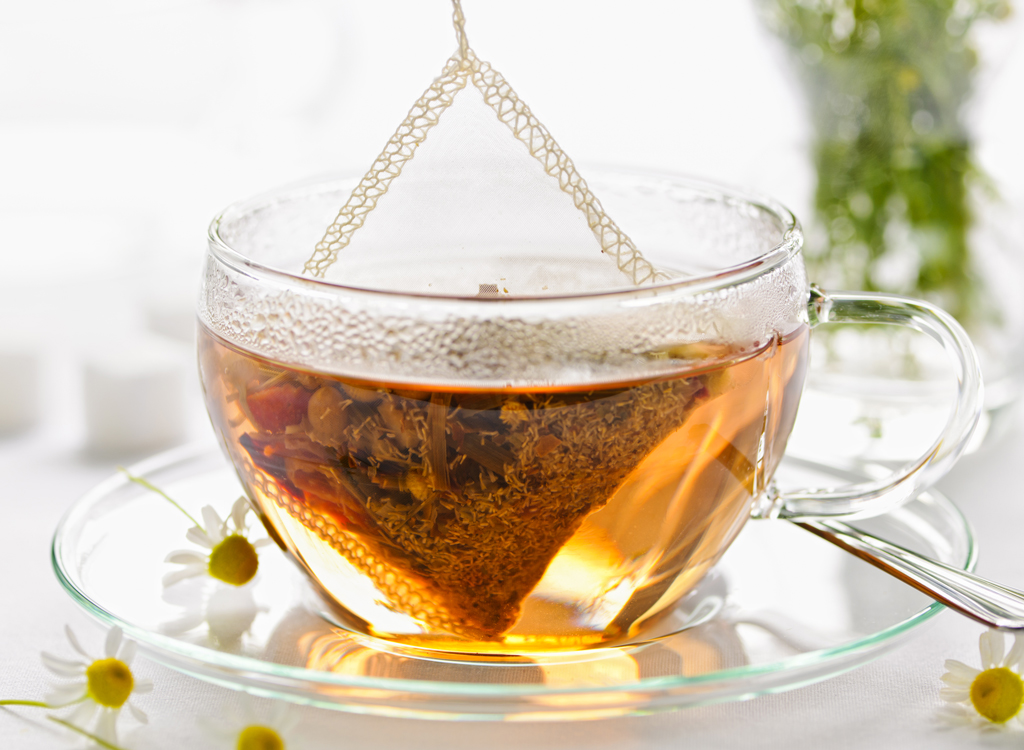
"Laxatives make you go to the restroom, where you are quickly removing any nutrients, vitamins, and minerals that may be in your intestines waiting to be absorbed into the body. If you continue on laxatives over the long-term, it can result in nutrient deficiencies and even illness," Toby Amidor, MS, RD, cautions. "There are appropriate and safe ways to lose weight, and taking laxatives is not one of them."
Wine Coolers
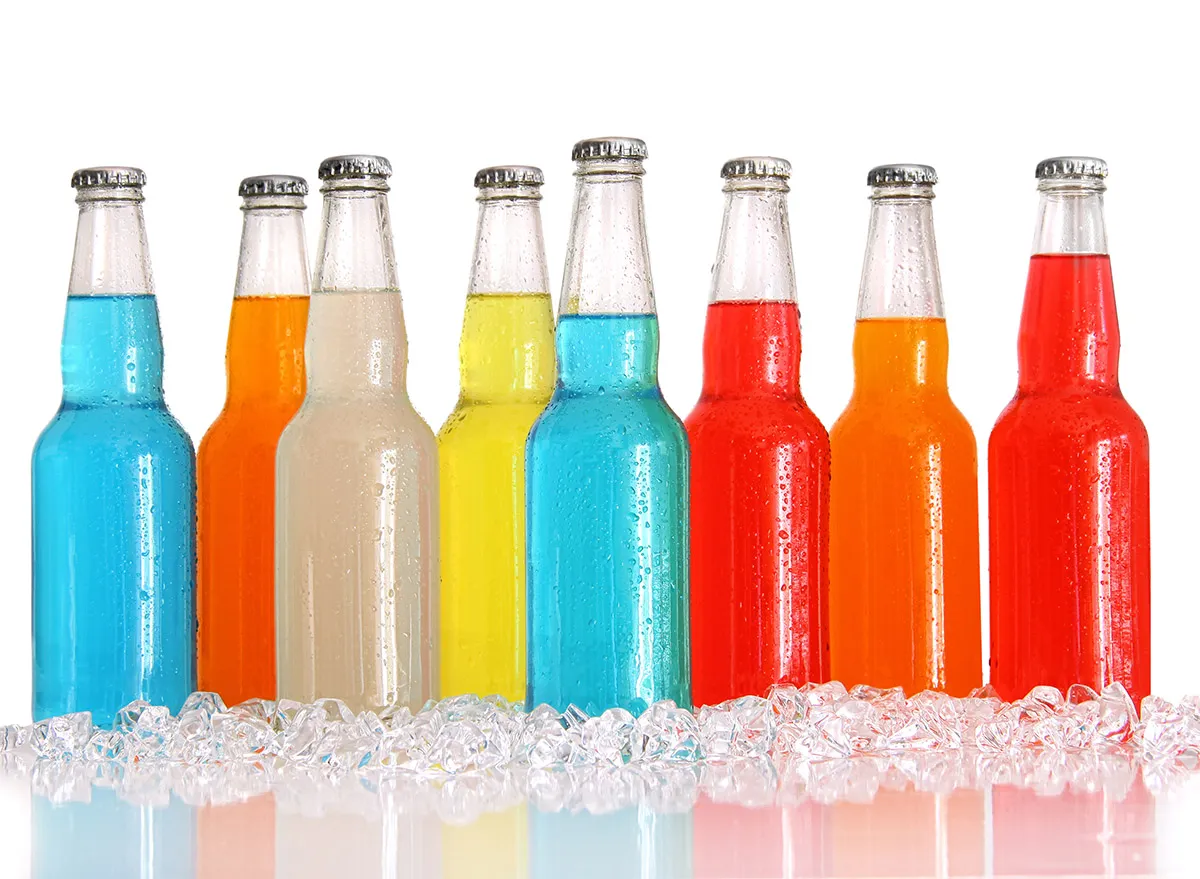
Instead of getting tipsy, these sugar-spiked beverages will just widen your waistline. Stick with a glass or two of red wine's powerful antioxidant benefits.
Beverage Concentrates
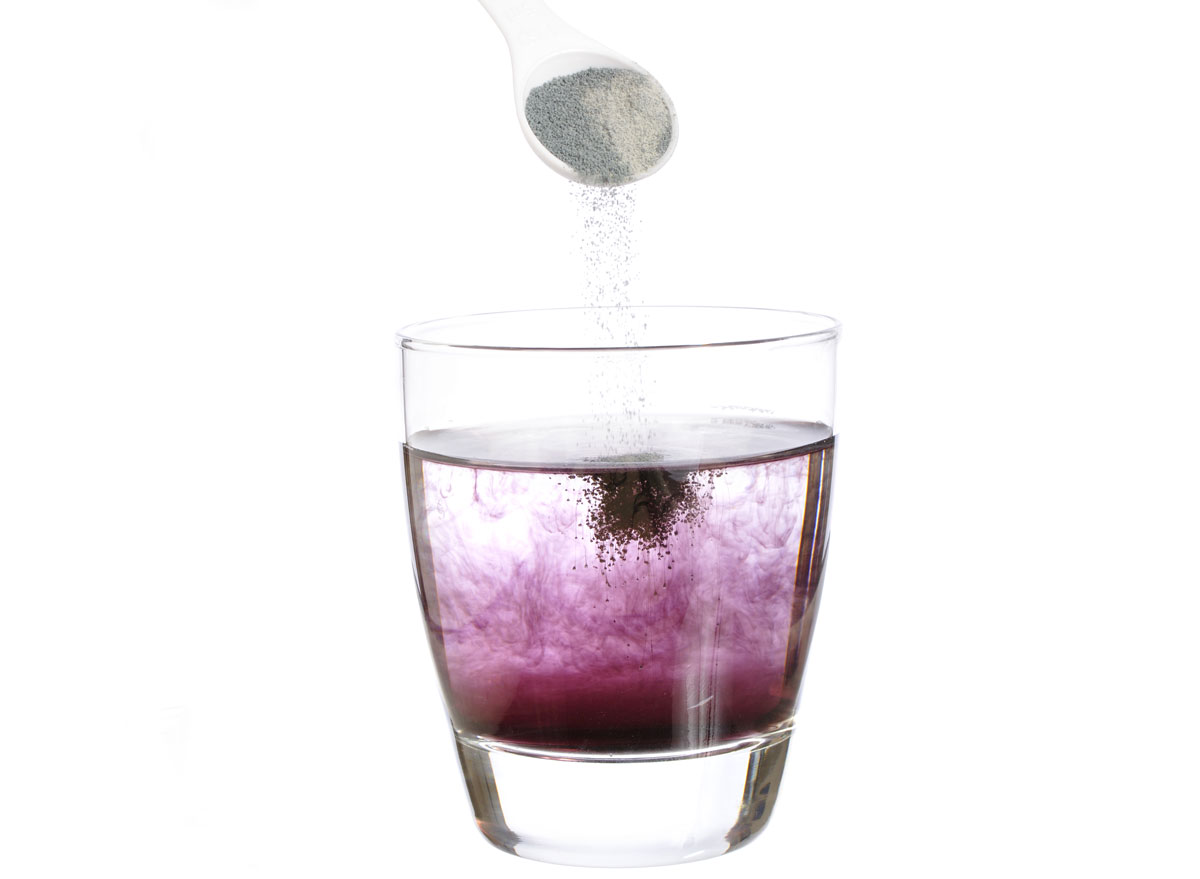
Considering most of these beverage flavoring agents are made with sketchy artificial sweeteners like acesulfame potassium and sucralose, we advise you to stay away. While acesulfame potassium is believed to have carcinogenic properties, sucralose is a sweetener that's been found to mess with your body's satiety signals.
Certain Bottled Teas
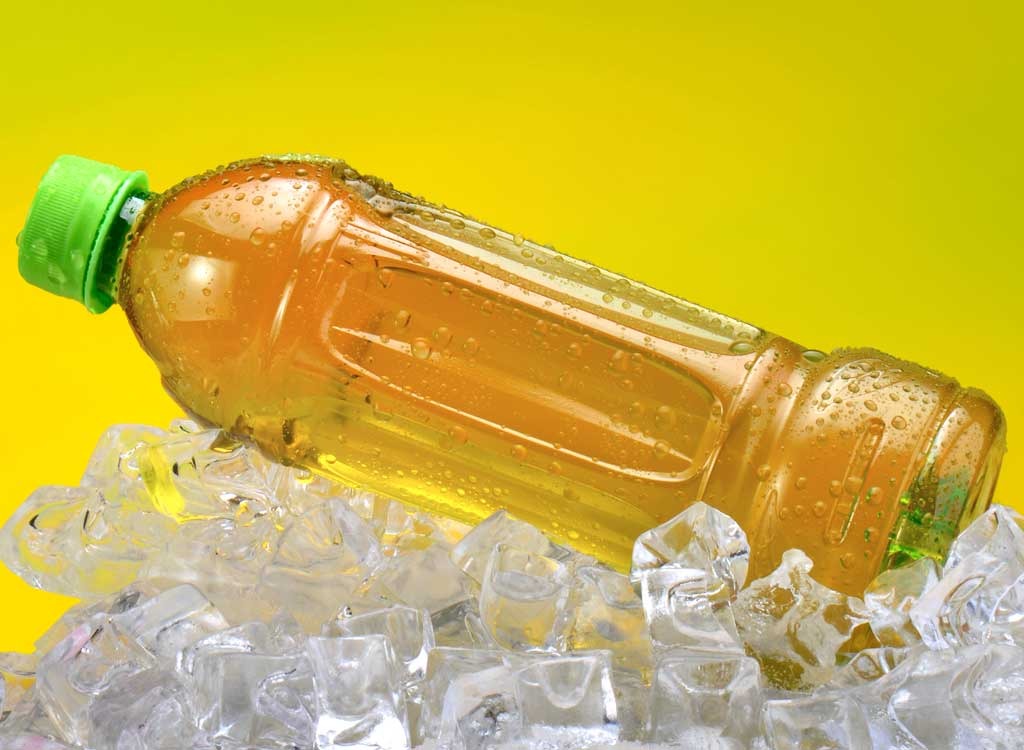
In its purest form, tea is one of the best weight-loss allies you'll find. It contains antioxidants, which have been found to help rev your metabolism, block the formation of new fat cells, fight off diseases, and lower risk of stroke. But not all teas are created equal—especially those sold in bottles. In fact, a study found that you'd have to drink 20 bottles of store-bought tea to get the same amount of antioxidants present in just one home-brewed cup. Plus, the bulk of the bottles brews get their brown hue from caramel color (instead of actual tea) and are packed with more sugar than you'd find in a handful of Chips Ahoy cookies.
Supersized Coffees

While a cup or two of coffee can do your body good, you may want to think twice before sizing up to a large or indulging in a fourth cup of Joe. The reason: Doing so may make your bones brittle. "I try to avoid excessive caffeine," says Dr. Mamta M. Mamik, Assistant Professor of Obstetrics, Gynecology and Reproductive Science at the Icahn School of Medicine at Mount Sinai. "An adult can safely consume up to 400 milligrams of caffeine a day (which is equivalent to four 8-ounce cups of coffee), but drinking any more than that can cause calcium excretion, which, over time, may lead to osteoporosis. Avoiding excess caffeine also helps to ward off uncomfortable withdrawal symptoms like lethargy, insomnia, headaches, and irritability," she adds.
Vitamin-Enhanced Waters
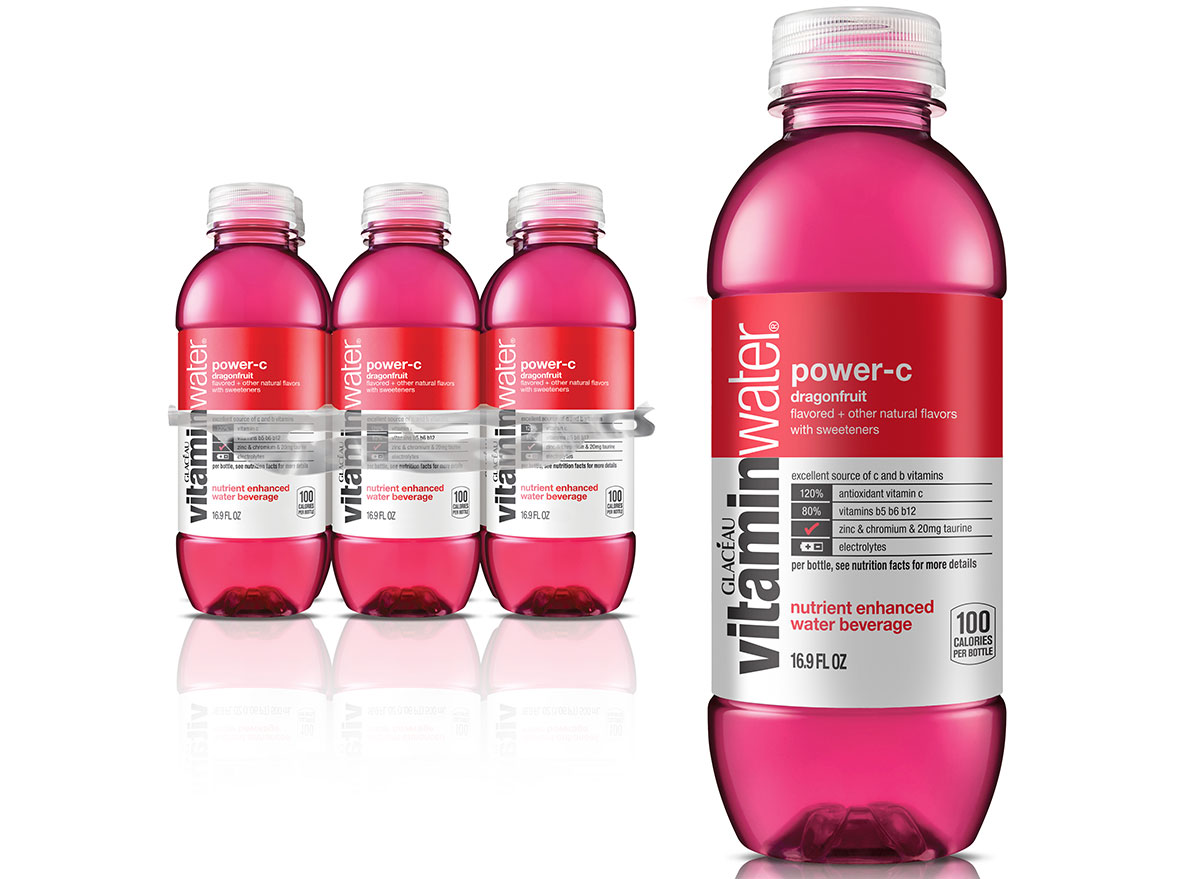
While they may have "water" in their name, these bottled beverages are 120 calories each, and every single one of those calories comes from sugar. And it's not just a little bit of sugar, either. There are 32 grams of in a 20-ounce bottle of Vitaminwater, which is 7 and ¾ teaspoons of the sweet stuff. If you want to infuse some flavor and nutrients into your water, ditch the bottled stuff and make a detox water instead.
Fast Food Iced Tea
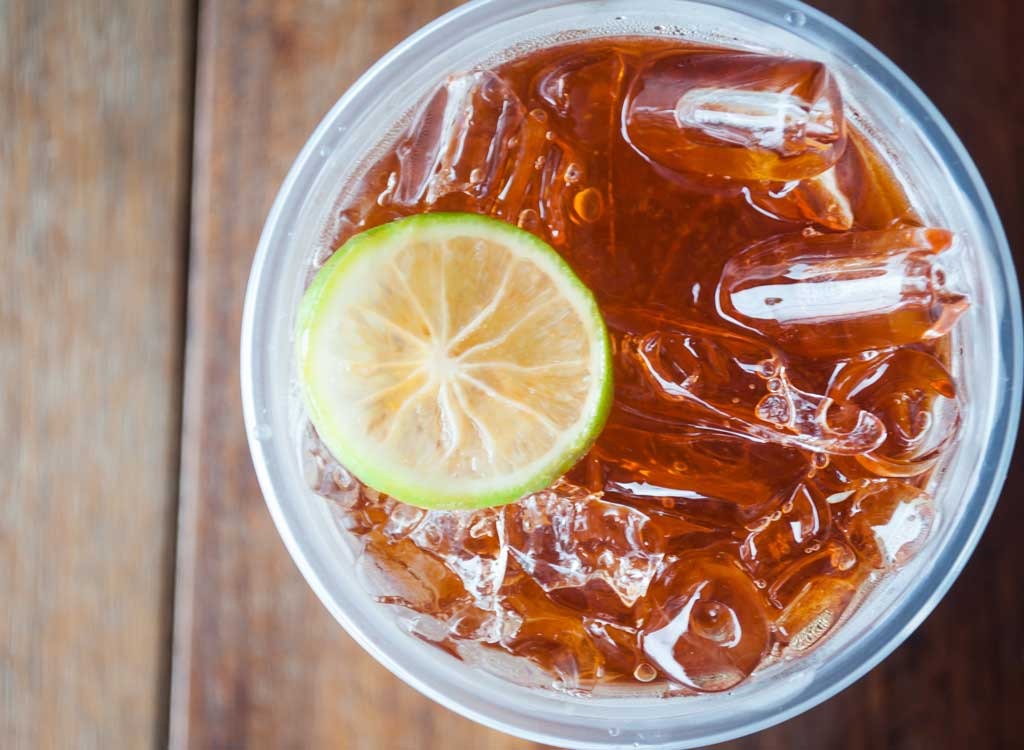
Spiked with sugar and caramel coloring, fast food iced tea is a definite no-go in our book!
Diet Soda
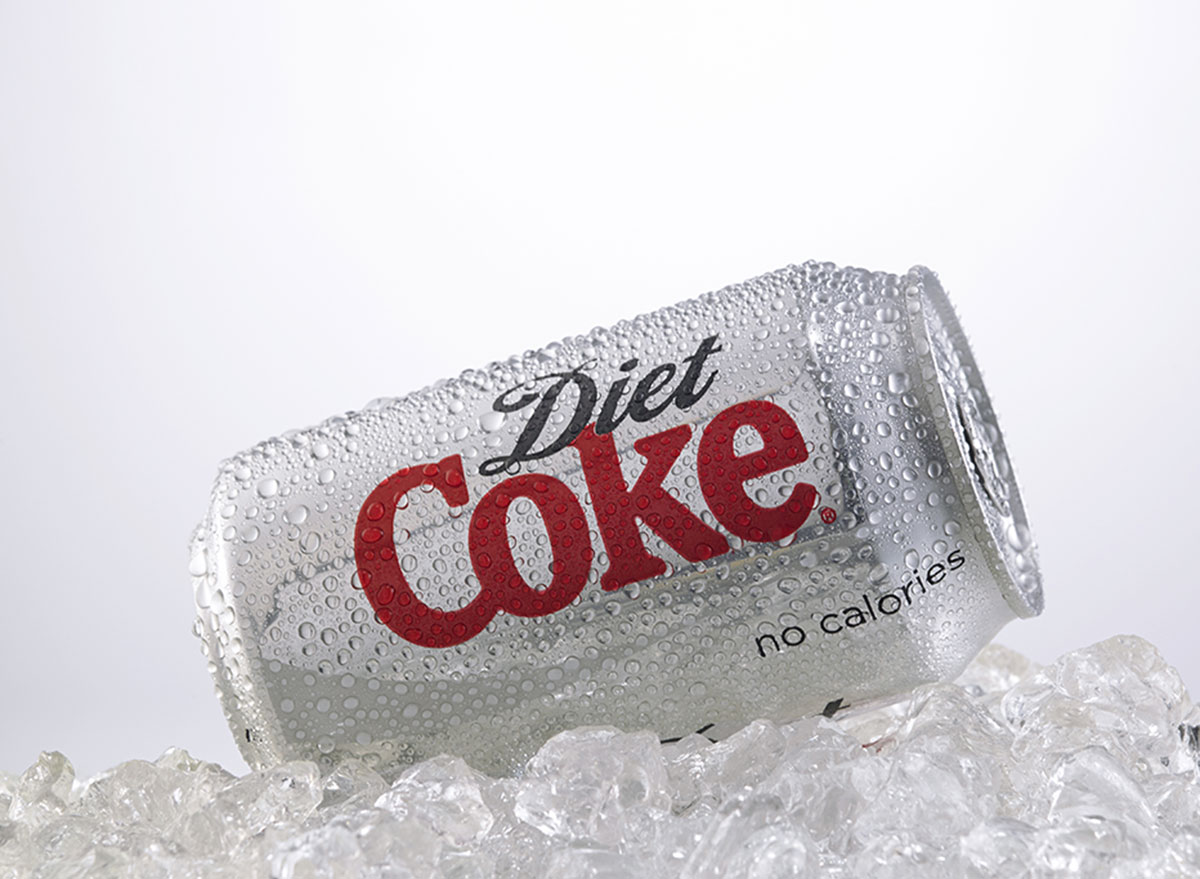
What do artificial colors and fat-causing fake sugars all have in common? They're in your favorite diet fizzy drinks. Nearly all popular diet sodas contain aspartame, an artificial sweetener that was initially developed to aid weight loss but has been found to have the opposite effect.
"Sugar substitutes like aspartame are designed to promote weight loss and decrease the incidence of metabolic syndrome, but a number of clinical and epidemiologic studies have suggested that these products don't work very well and may actually make things worse," says Richard Hodin, MD.
Liquid Coffee Creamer
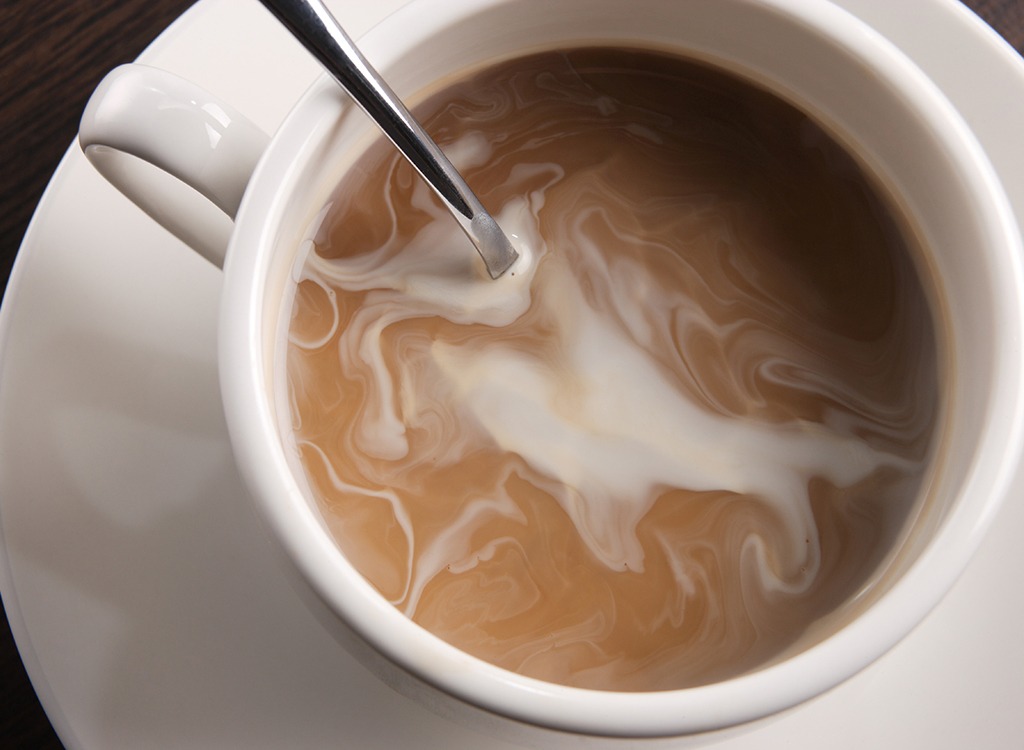
The problem with coffee creamer? There's no cream and a lot of processed ingredients you simply do not need to be drinking. Instead, try out a plant-based creamer if you need something to jazz up your cup of Joe, such as the varieties from Califa Farms. These creamers have fewer calories and sugar than the typical Nestlé Coffee-Mate Creamers.
Frozen Cocktails
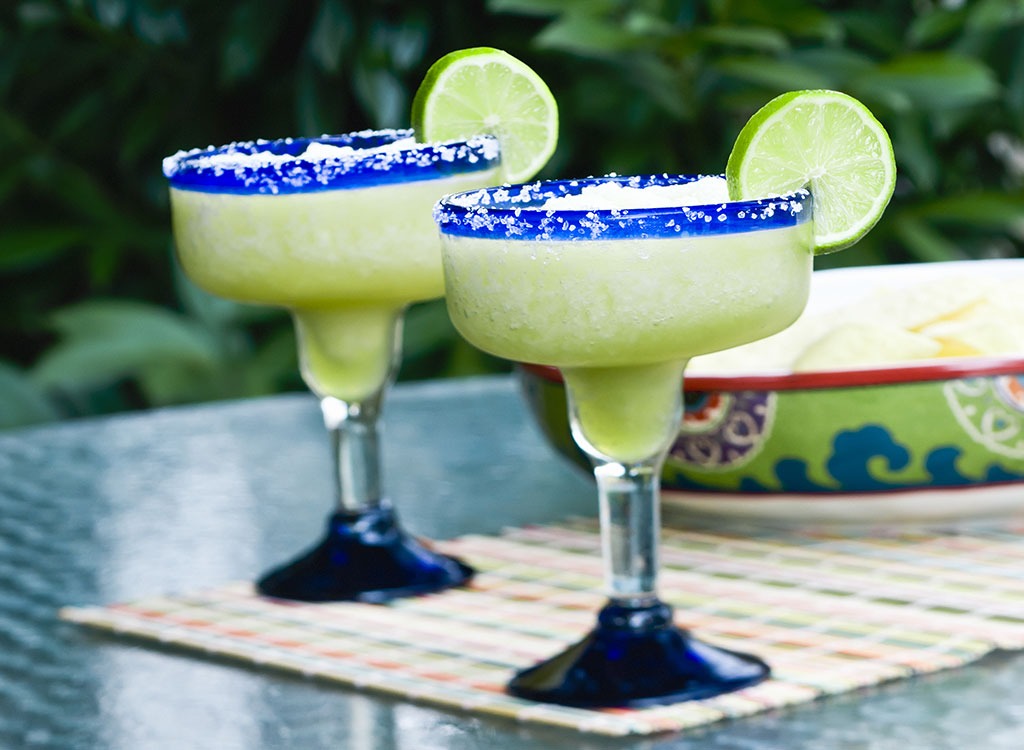
While whipping up a frozen marg at home isn't quite as bad as getting it from a bar, it's still the worst cocktail for your waistline, ranging from 400-700 calories, depending on if you make the drink yourself at home or order it while you're out. Made with a sugar-spiked neon mix and tequila, the summer staple will overload your system with more sugar than you'd find in nine Dunkin' Donuts Apple n' Spice Donuts! Other frozen beverages aren't much better, either. The average strawberry daiquiri, for example, has more than 200 calories and upward of 40 grams of sugar per serving. Not to mention, it's also 99 percent high fructose corn syrup. Switch to a glass of bubbly with muddled strawberries and lemon slices to get your fruity fix for a fraction of the waist-widening calories
Fruit Juice

Sure, it's natural and overflowing with vitamin C, but it's loaded with sugar—and totally void of any nutrients like fiber or protein to help slow the sugar spike. An average glass packs 36 grams of sugar—or about what you'd get from popping 4 Krispy Kreme glazed donuts into a blender and hitting frappe. What's more, most of the sweetness in juice comes from fructose, a type of sugar associated with the development of belly fat. A better drink for citrus lovers? Water flavored with fresh slices of oranges, lemon, and grapefruit. For added benefits, keep the peels on. Citrus peels contain the antioxidant d-limonene, a powerful compound that helps flush out stored visceral fat.
Conventional Skim Milk
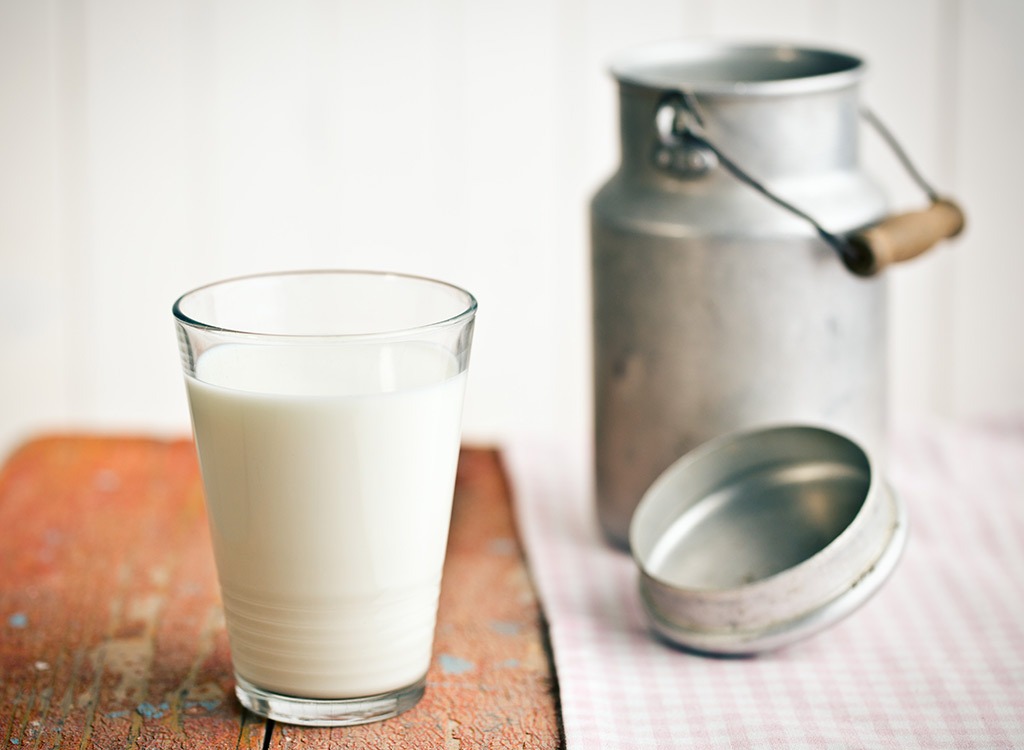
While skim milk may be lowest in calories, many of its vitamins are fat-soluble, which means you won't get all the benefits of the alphabetical nutrients listed on your cereal box unless you opt for at least 1%. Why's it important to opt for grass-fed, organic cartons over the conventional stuff? Not only does it taste better and stay fresh longer, when the herds graze on grass instead of feed, their milk has higher levels of omega-3s and CLA (conjugated linoleic acid), a nutrient that boosts immunity, improves bone mass, and even reduces body fat—gotta love that!
Canned Energy Drinks
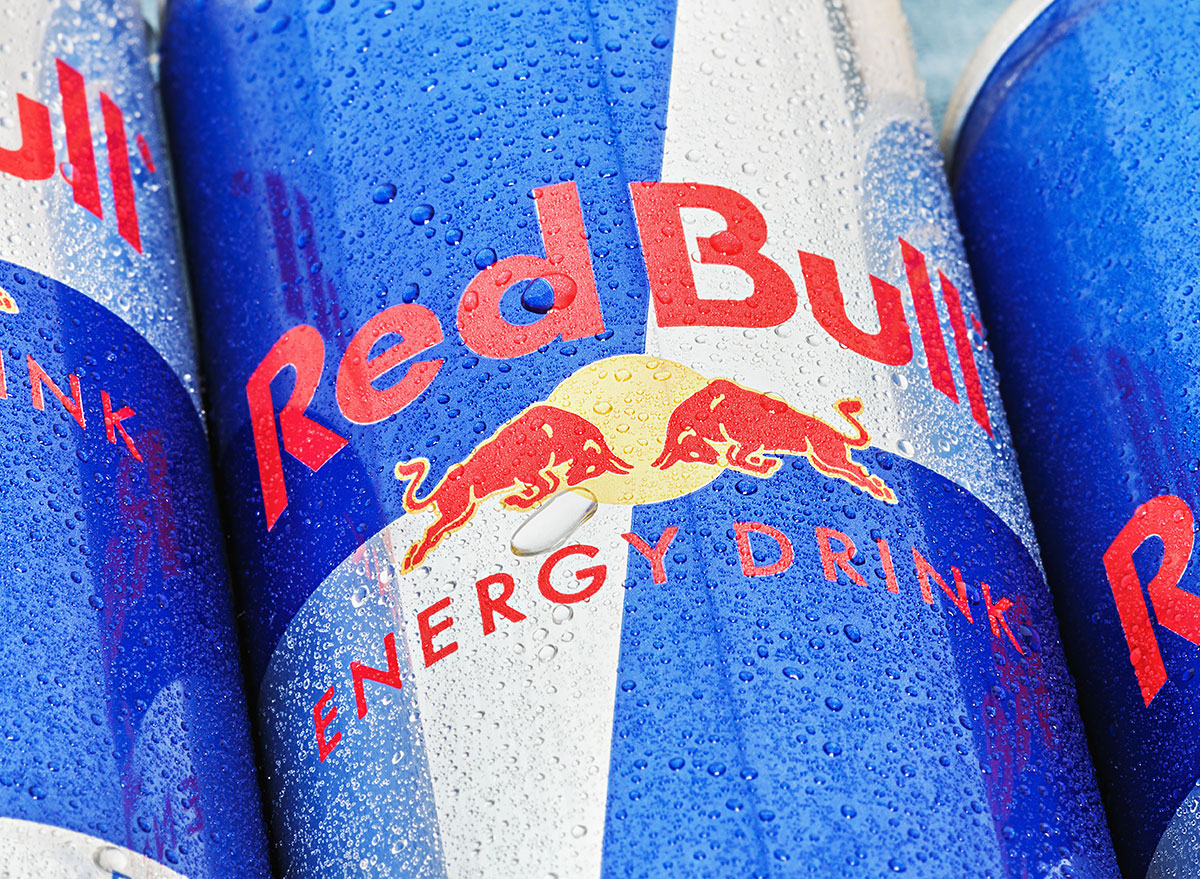
These overpriced chemical cocktails may give you a surge of energy, but they're riddled with harmful sweeteners (many of which made our list of these best and worst popular sweeteners) and are even more corrosive to your teeth than regular soda. Just say no to these drinks!
Fruity Sodas
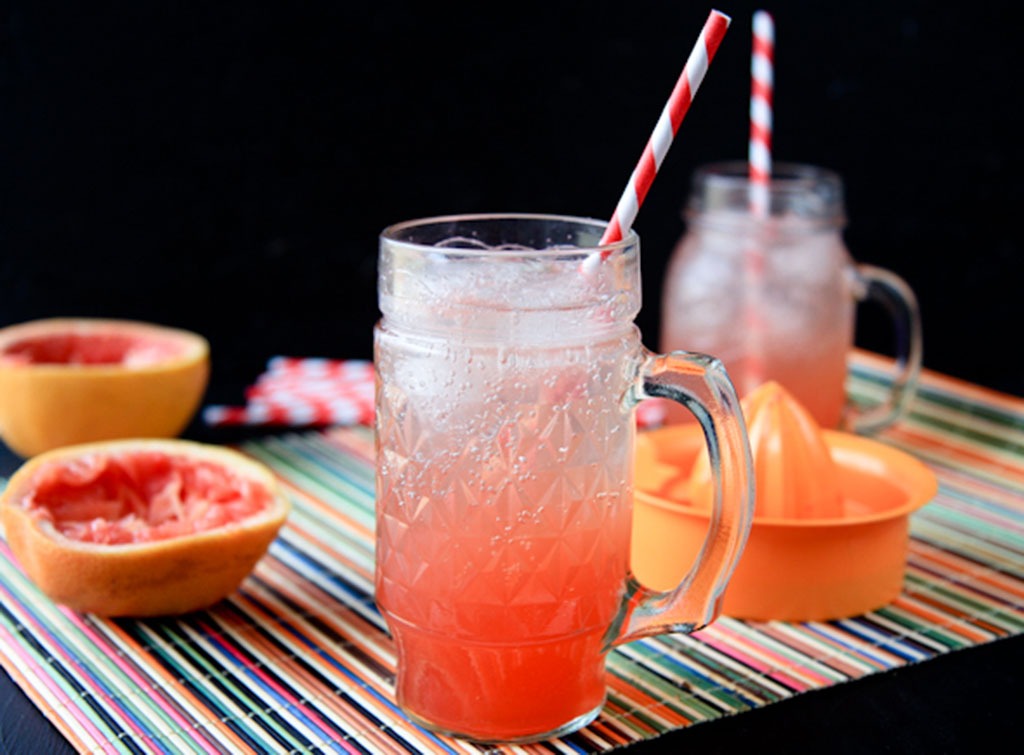
It may have images of brightly colored fruit on the can but that doesn't mean it carries any health benefits—or actual fruit, for that matter. What they do contain, however, is as much sugar as three Snickers Ice Cream bars and stomach-churning chemicals like red 40, sodium benzoate and the chemical BVO, which has been said to negatively affect thyroid hormones.
Bottled Alcoholic Mixers

Most people mix up a cocktail to boost their mood and cut loose. But if you typically combine the stiff stuff with a bottled mixer you may be doing more hard them good—and not only when it comes to your waistline. "[Cocktail mixers are] a lot like soda drinks when it comes to their sugar content," celebrity nutritionist and health consultant Mikaela Reuben tells us. "The effect of their high sugar content is the same; the sugars will be released into the bloodstream, allowing an energy boost to take place but ultimately ends in a low point, leaving one to feel fatigued, irritable, and depressed." To mix a better-for-you cocktail, stick with things like flavored seltzer and freshly squeezed lime juice.
Eggnog
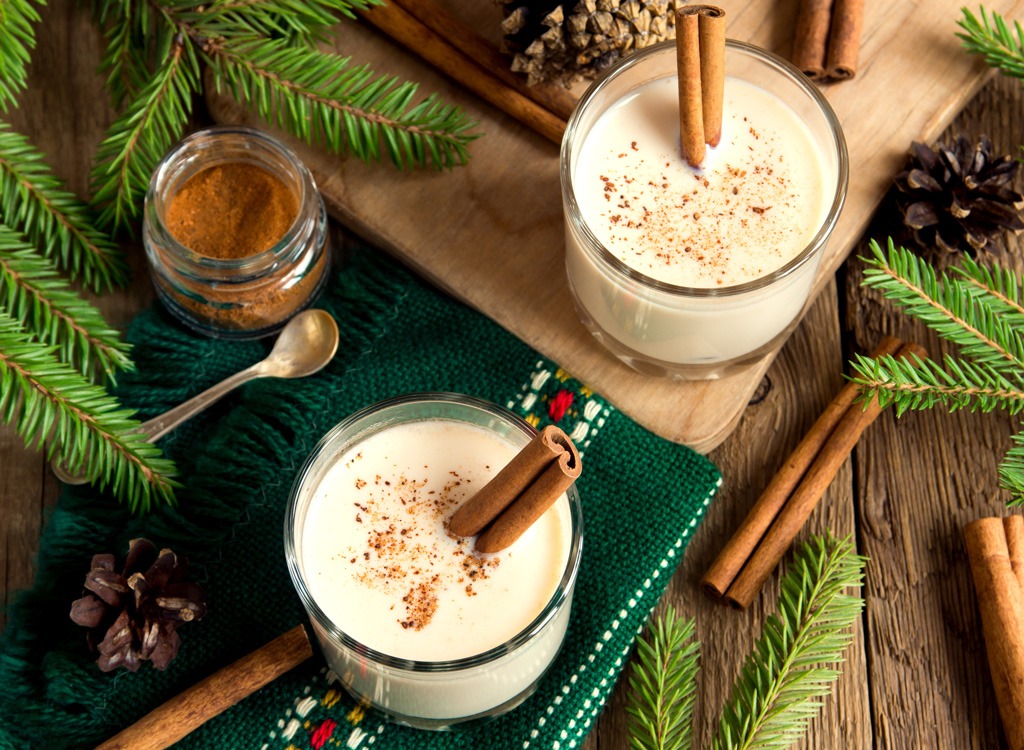
With or without added liquor, it shouldn't come as a surprise that traditional eggnog is a calorie bomb that belongs on the naughty list: the primary ingredients are milk, cream, and eggs. To save 200 calories, make yours with organic unsweetened almond milk instead of milk and cream.
Commercial Hot Cocoa
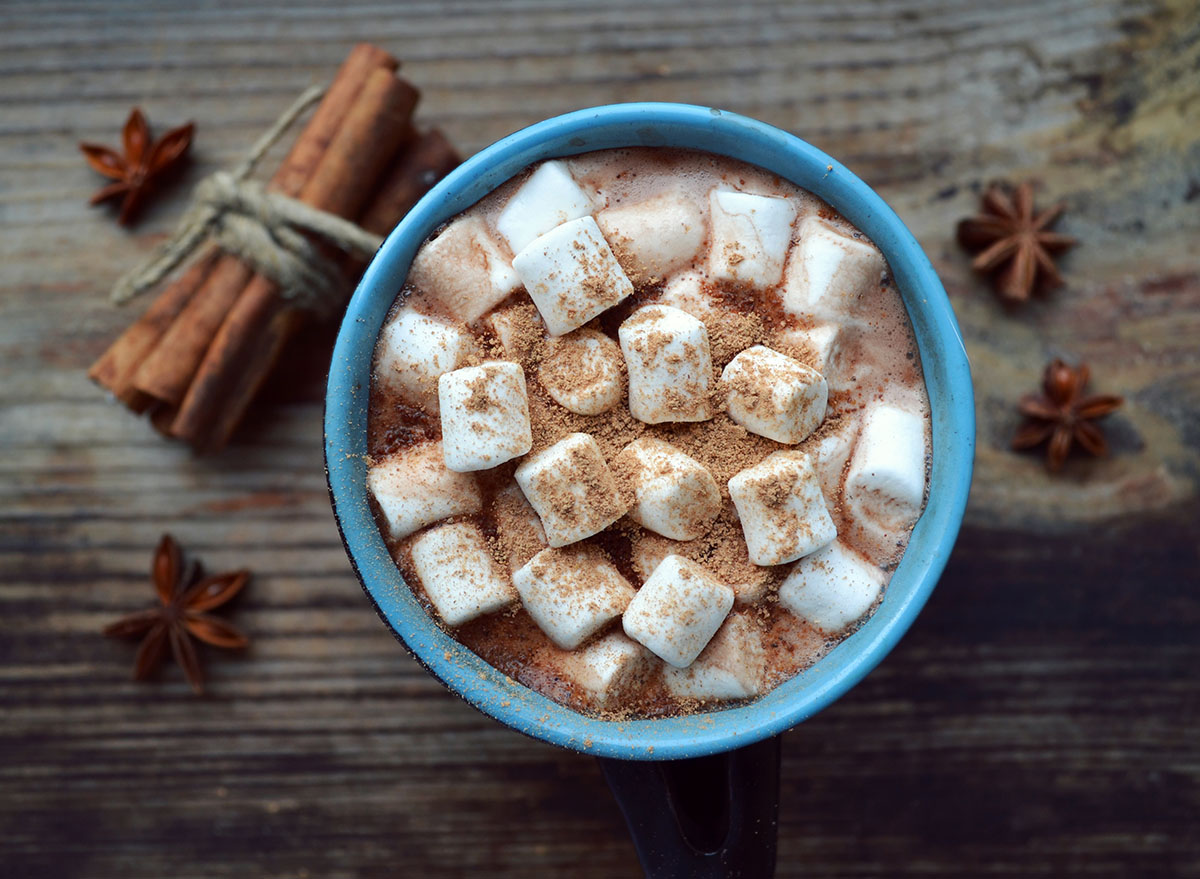
While it's true that packets of hot cocoa aren't great in terms of nutrition, the kind you get from restaurants and coffee joints are far worse. A 16-ounce Starbucks hot chocolate with 2% milk and whipped cream, for example, has half a day's saturated fat, 400 calories, and 43 grams of sugar, which is two-and-a-half times as much as you'll find in the brand's make-at-home packets.
Mudslides
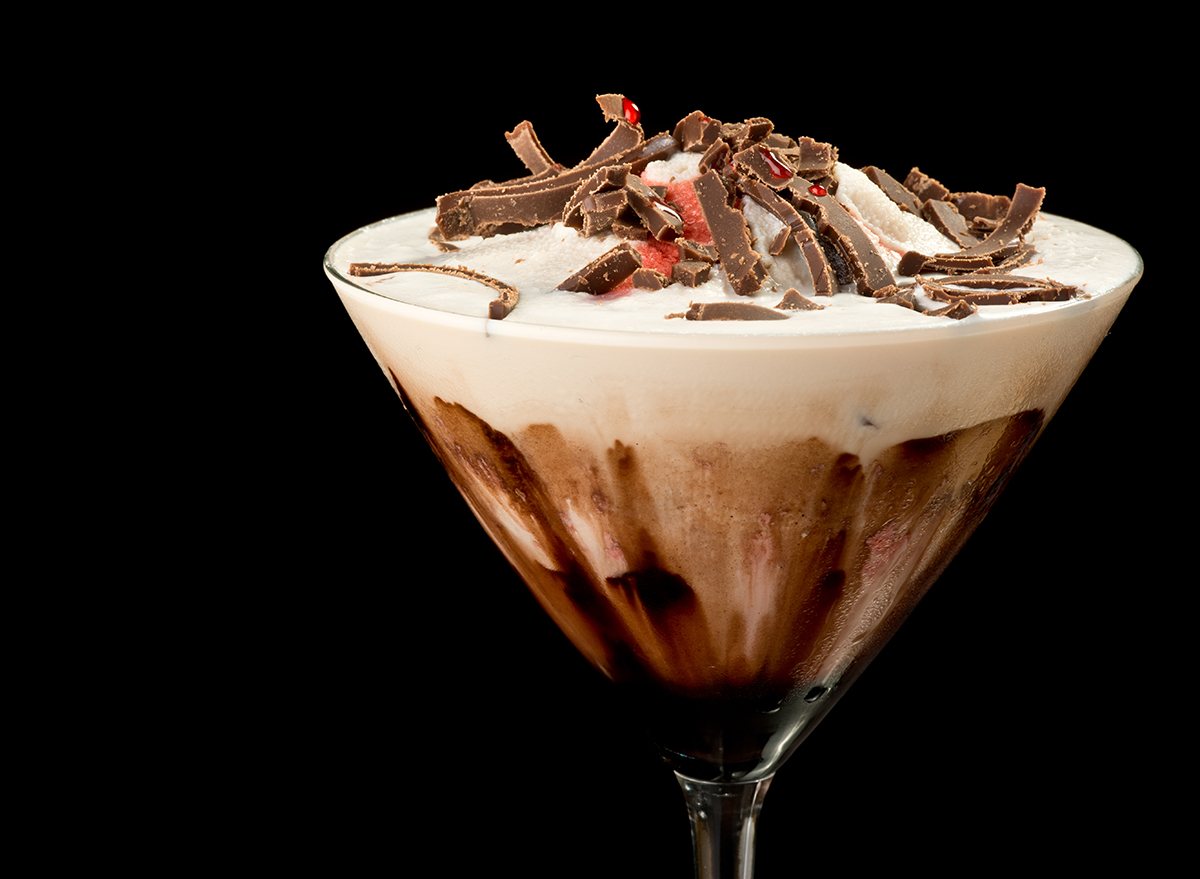
Vodka, Kahlua, Baileys Irish Cream, milk, and chocolate syrup combine together to create this fatty concoction that's bound to not only leave you tipsy but severely bloated, too. An average cocktail has a staggering 750 calories!
Ginger Beer
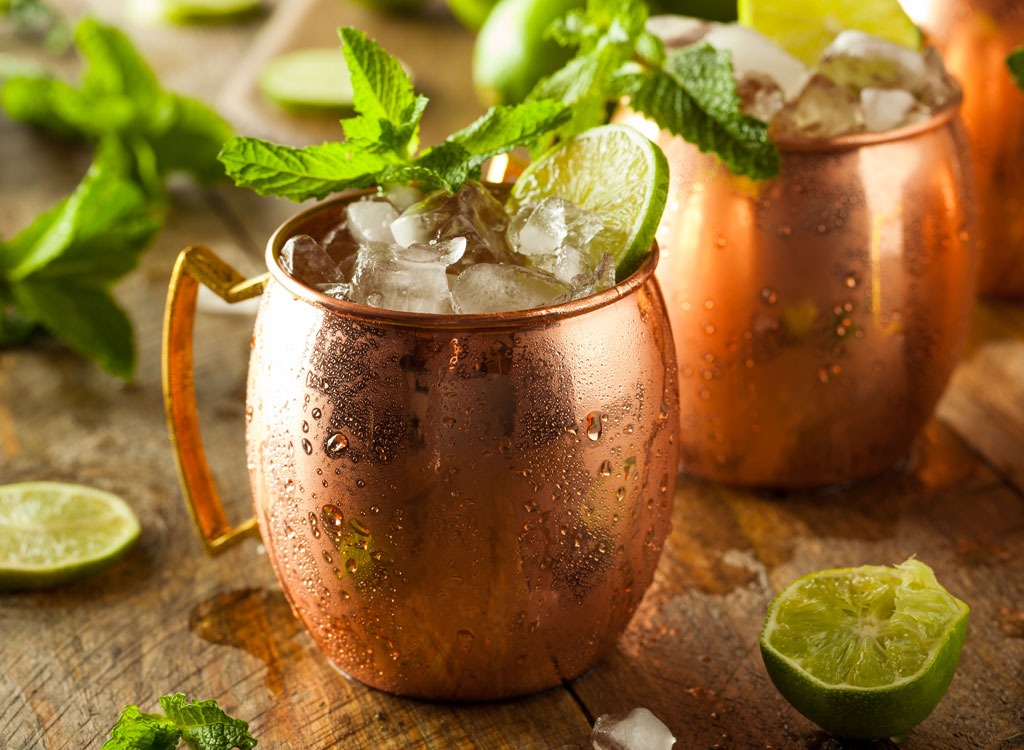
Sorry, Moscow Mule fans but ginger beer isn't good news for your waistline. In fact, it's one of the most calorie-dense carbonated drinks on the market. An average 7-ounce serving has 170 calories, which breaks down to about 24 calories per ounce.
Orange Drinks
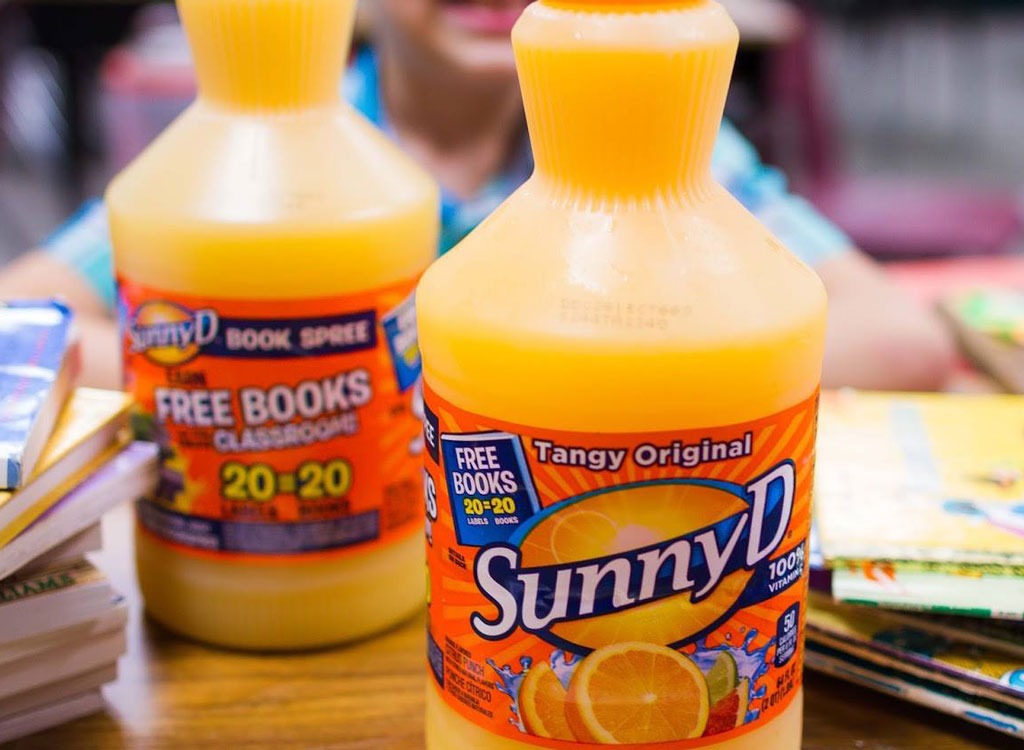
Just how Velveeta isn't real cheese, SunnyD isn't actual juice; it's just a mix of water, high fructose corn syrup, and a few token dribbles of juice concentrates, canola oil, and chemicals. Their tagline may be "When life gives you oranges, make SunnyD," but don't be fooled, there's hardly any oranges in the bottle—which is why it has zero nutritional benefits.
Sweetened Milk Alternatives

Sweetened milk alternatives aren't just spiked with additives like stomach-irritating carrageenan; they're also typically low in protein and a concentrated source of sugar. (A combination that will leave your stomach rumbling!) An 8-ounce serving can easily carry as much of the sweet stuff as a half a can of soda, none of which is naturally occurring. Cow's milk, on the other hand, gets all of its sweetness from naturally occurring lactose, a sugar present in milk.
Regular Cola Soda
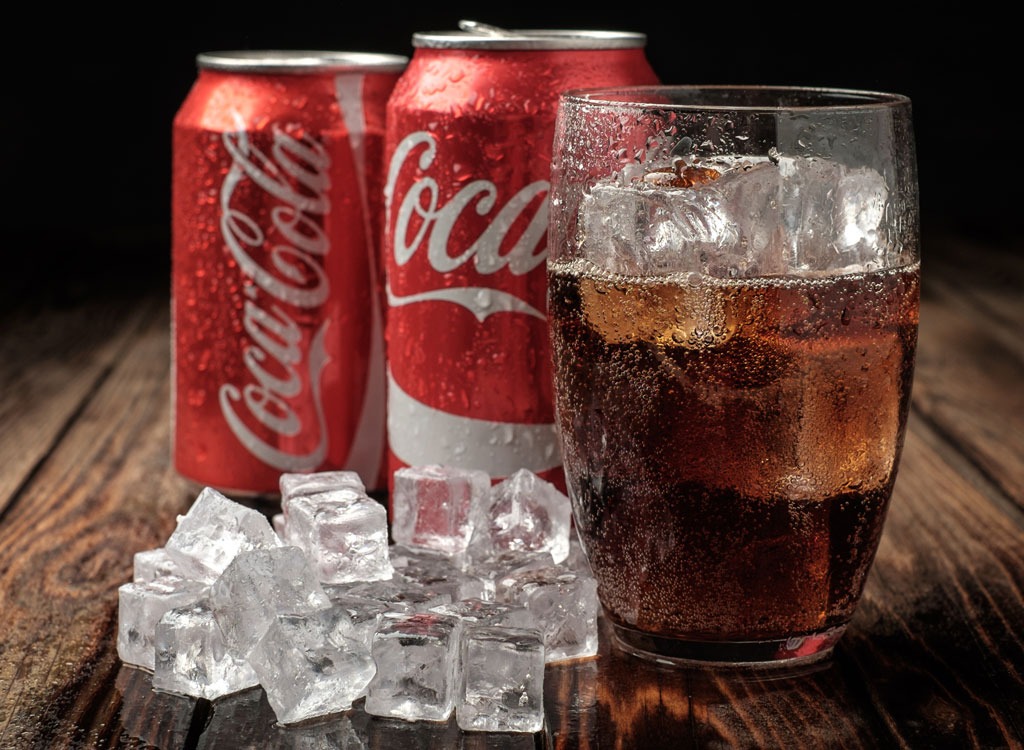
Not only does regular soda contribute to weight gain and obesity-related diseases like diabetes, but its acidity is also bad news for your digestive system and tooth enamel. The bad news keeps on coming: The caramel color in soda contains an artificially created phosphorus that can be bad for long-term bone health, cautions Isabel Smith, MS RD CDN, of Isabel Smith Nutrition.
Powdered Fruit Drinks
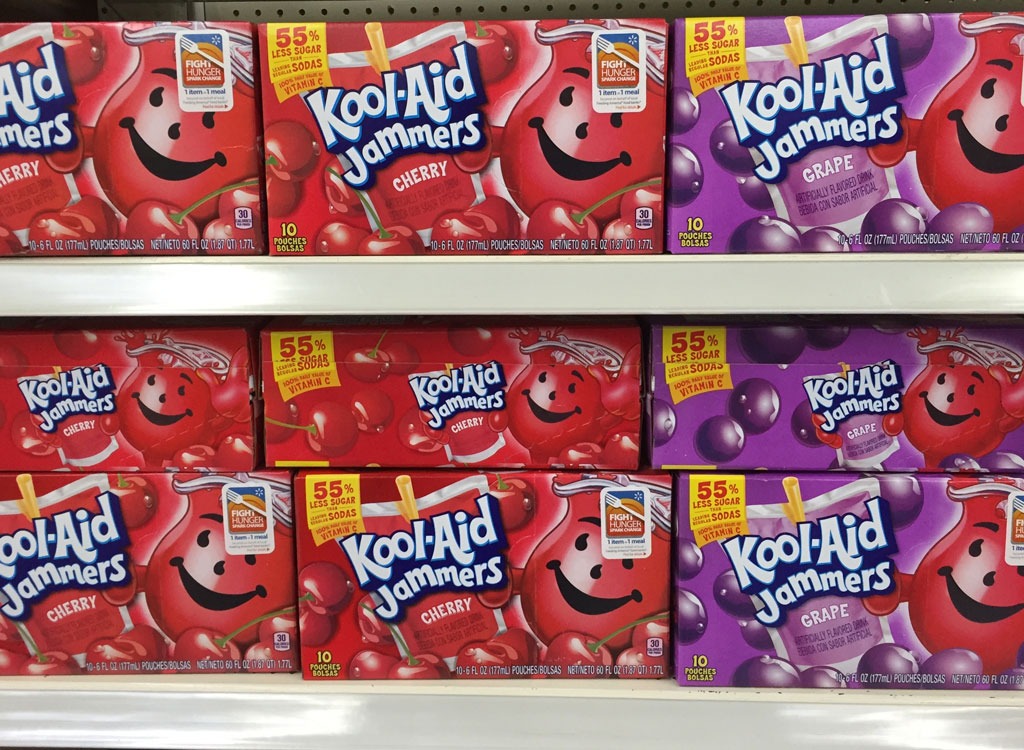
Tang, Kool-Aid, and other drink powders are little more than a mix of sugar and artificial coloring. If you wouldn't pour food dye and cups of sugar straight into your mouth, you're better off saying "no" to these waist-widening drinks.
Certain Protein Shakes
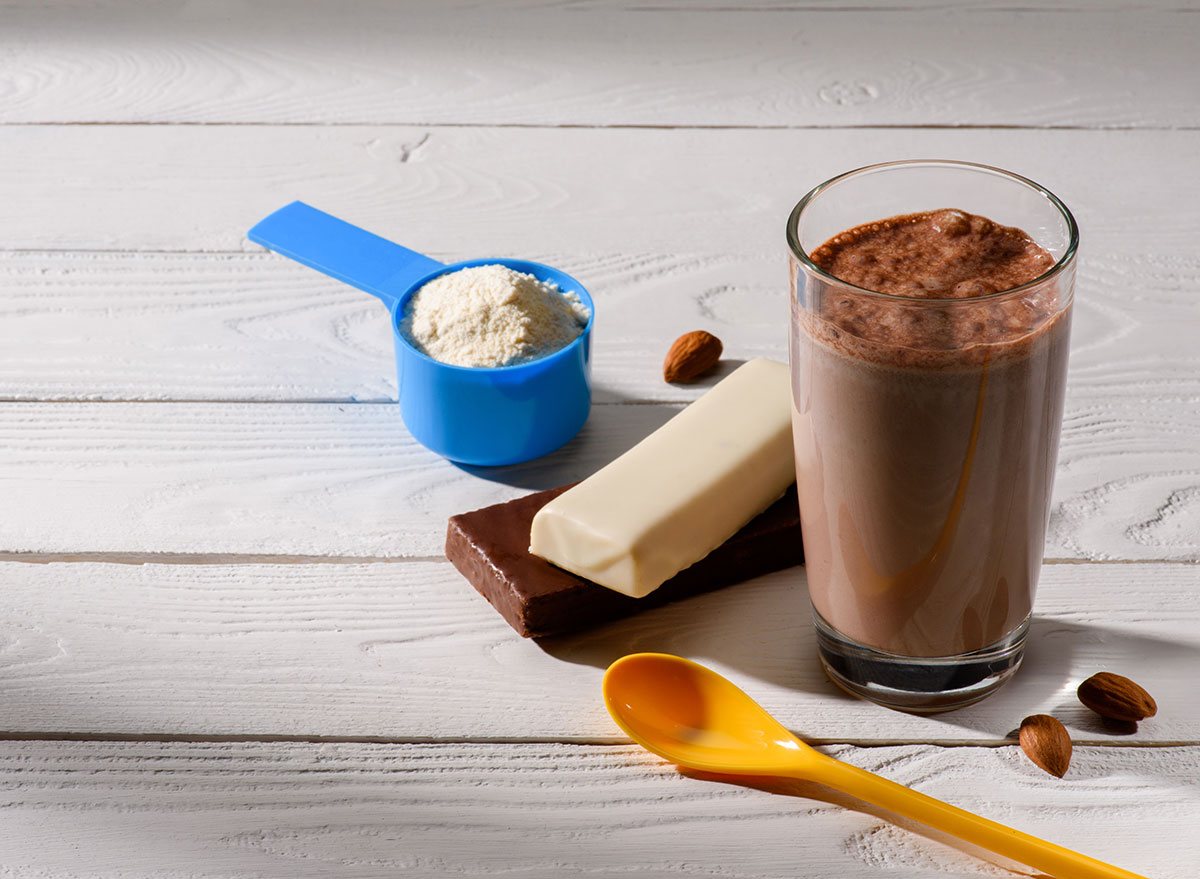
Chugging a protein shake can be an easy way to refuel after a workout, but make sure you're not downing the wrong one. Many powders out there sneak in artificial sweeteners, chemical additives, and partially hydrogenated oils.
Double IPAs
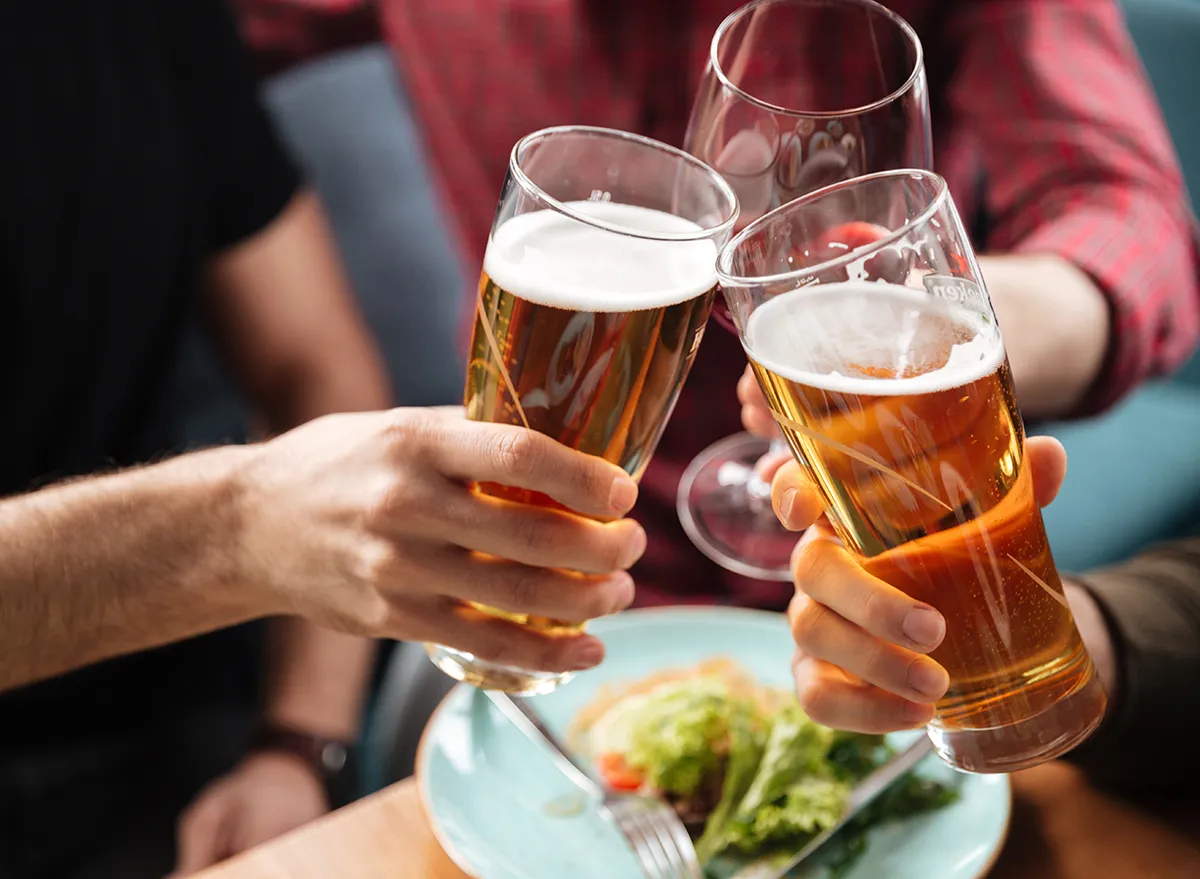
How's a double IPA made, you ask? Just as its name suggests, the ingredients that go into a regular IPA are doubled, resulting in a higher calorie and alcohol count for which you're going to need these 25 Best Foods For A Hangover Cure.
Energy Shots
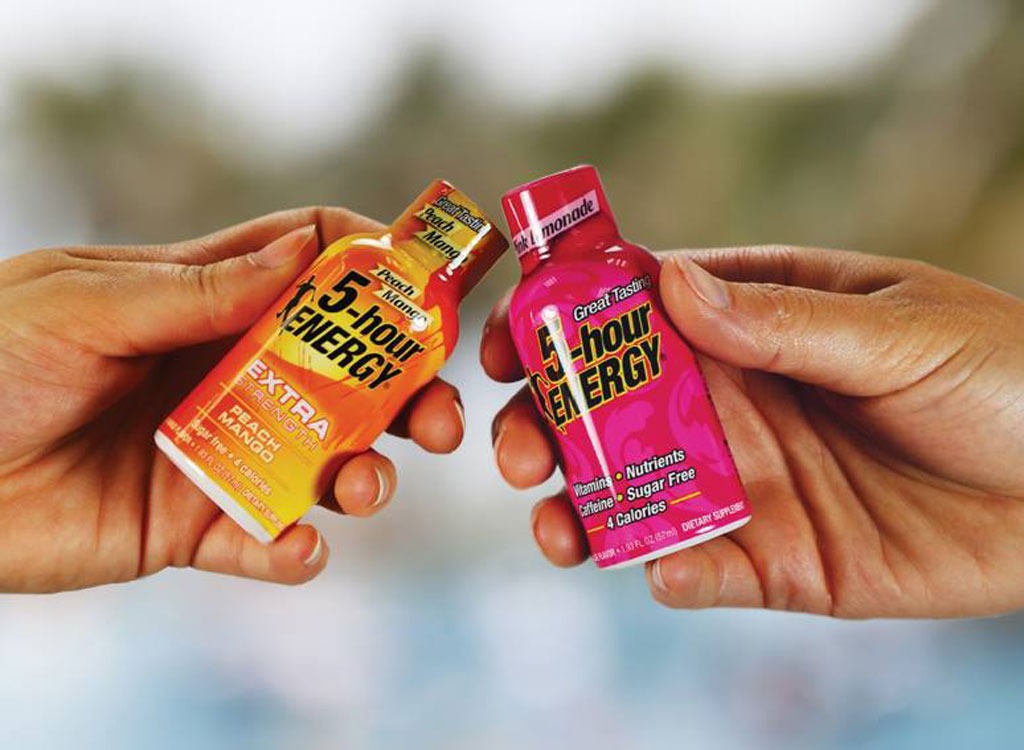
The majority of these little shooters are made up of chemicals, one of which is sodium benzoate. In one study of the effects of sodium benzoate on living yeast cells, researchers found benzoate to be damaging to mitochondria, an important area of DNA. Eek! What's more, these bad boys rely on waist-widening artificial sweeteners to achieve their sweet flavor.
Fancy Coffee Drinks
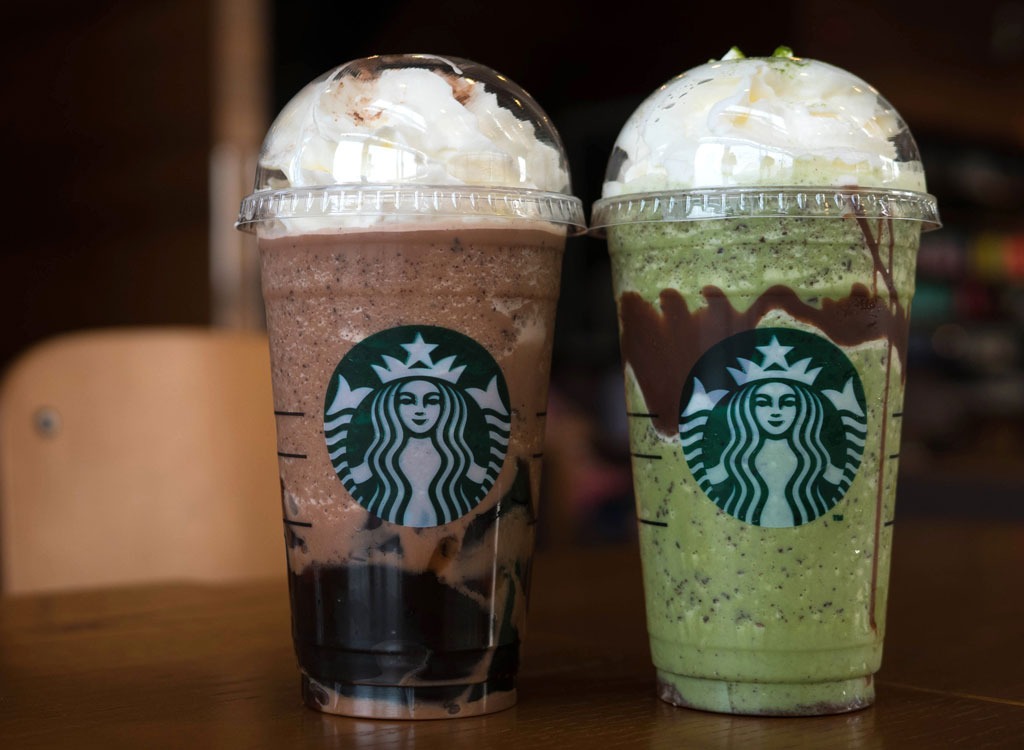
In terms of sugar, a 12-ounce can of Coke = 14 Hershey Kisses. Think that's bad? The majority of your favorite coffee drinks are far sweeter. Take Dunkin's frozen Vanilla Bean Coolatta, for example. A small size of the drink packs 420 calories and 89 grams of sugar—yes, in a small! Warm drinks are just as bad. McDonald's McCafe mocha has 340 calories and 45 grams of the sweet stuff, while Starbucks' eggnog latte has 450 calories and 52 grams of sugar in a grande size.
Slushies
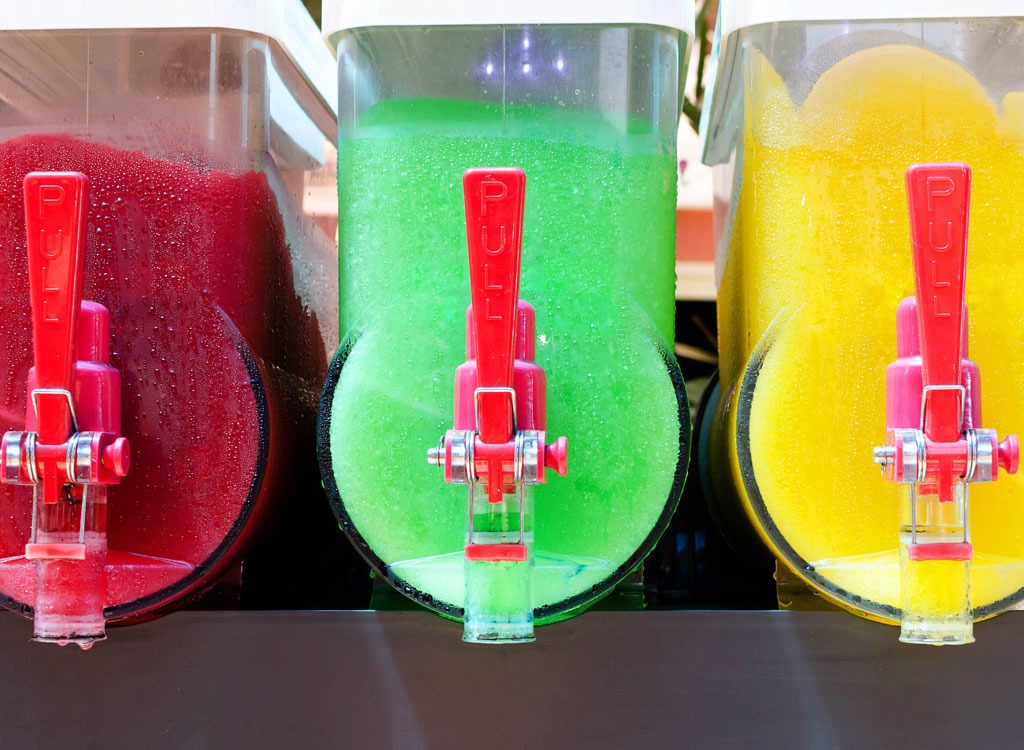
You probably already know that slushies were sugar mines, but we bet you had no clue they're often filled with mold! Totally gross, we know, yet totally true! According to numerous fast food and convenience shop workers, the machines that store and blend slushies are rarely—if ever—cleaned. "The amount of mold in those machines would crush your childhood into a pulp," a former gas station worker admitted on Reddit. If the calorie and sky-high sugar counts weren't enough to turn you off of the sips, maybe those bits of information will. To whip up a homemade version at home, freeze, then blend watermelon chunks into a sweet and satisfying slushy.
Bottled Smoothies
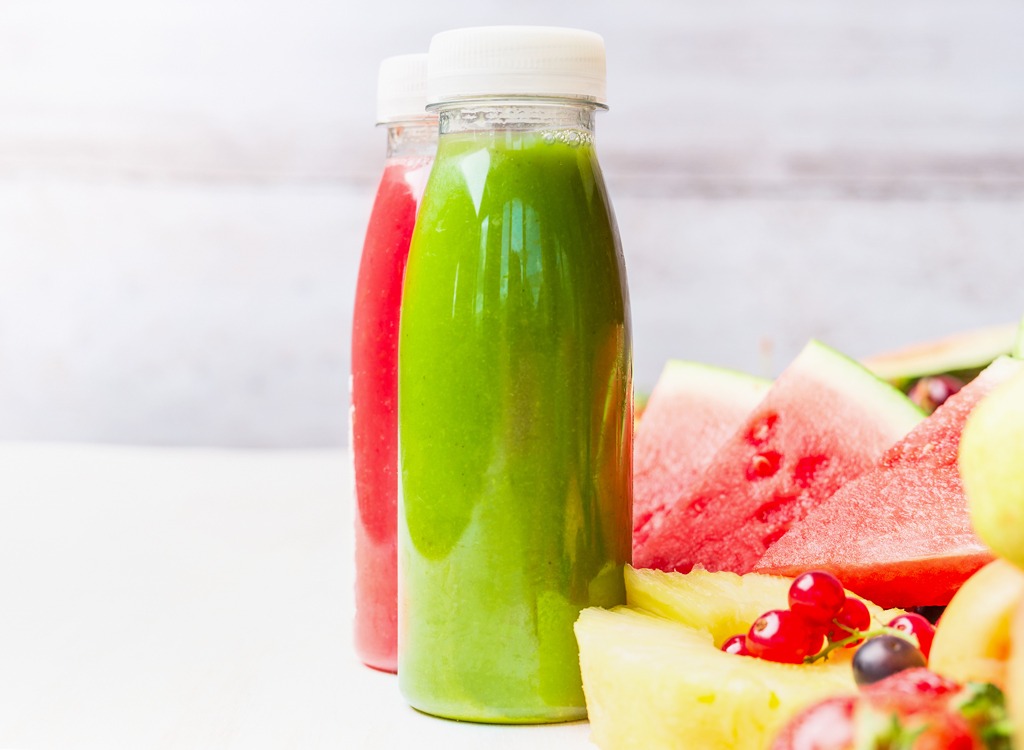
Busy mornings and grab-and-go breakfasts are practically synonymous—so it's easy to see the appeal of store-bought smoothies. They seem like the best way to get what you crave in a pinch. But the timesaving drinks have a downside: compared to fresh-made drinks, most of them fall short on nutrition and are so calorie- and sugar-filled that you'd have to spend hours on the treadmill to burn them off.
Sports Drinks
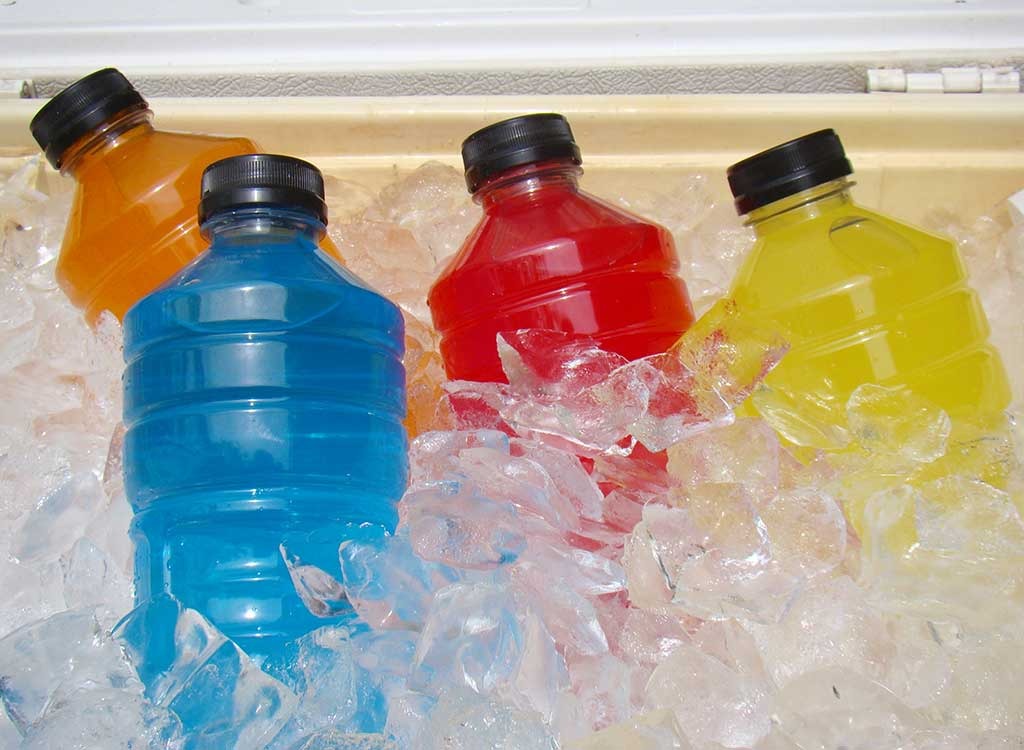
Whoever invented the Gatorade Dunk—the tradition in which winning sports teams dump coolers of the stuff on their coaches—was really on to something. One scan of the nutrition label and it's clear: the sports drink is better off seeping into the sidelines than your stomach. Sure, it provides critical post-workout electrolytes, like sodium and potassium, but it also serves up a hearty helping of calories and sugar. In fact, there are 52 grams of the sweet stuff (which is more than a day's worth) in a 32-ounce bottle. What's more, the beverage is teeming with stomach-churning additives like artificial dyes. A better (and safer) way to replenish the electrolytes and water lost after a tough workout: try drinking a more natural beverage, like HALO Sport.
Milkshakes
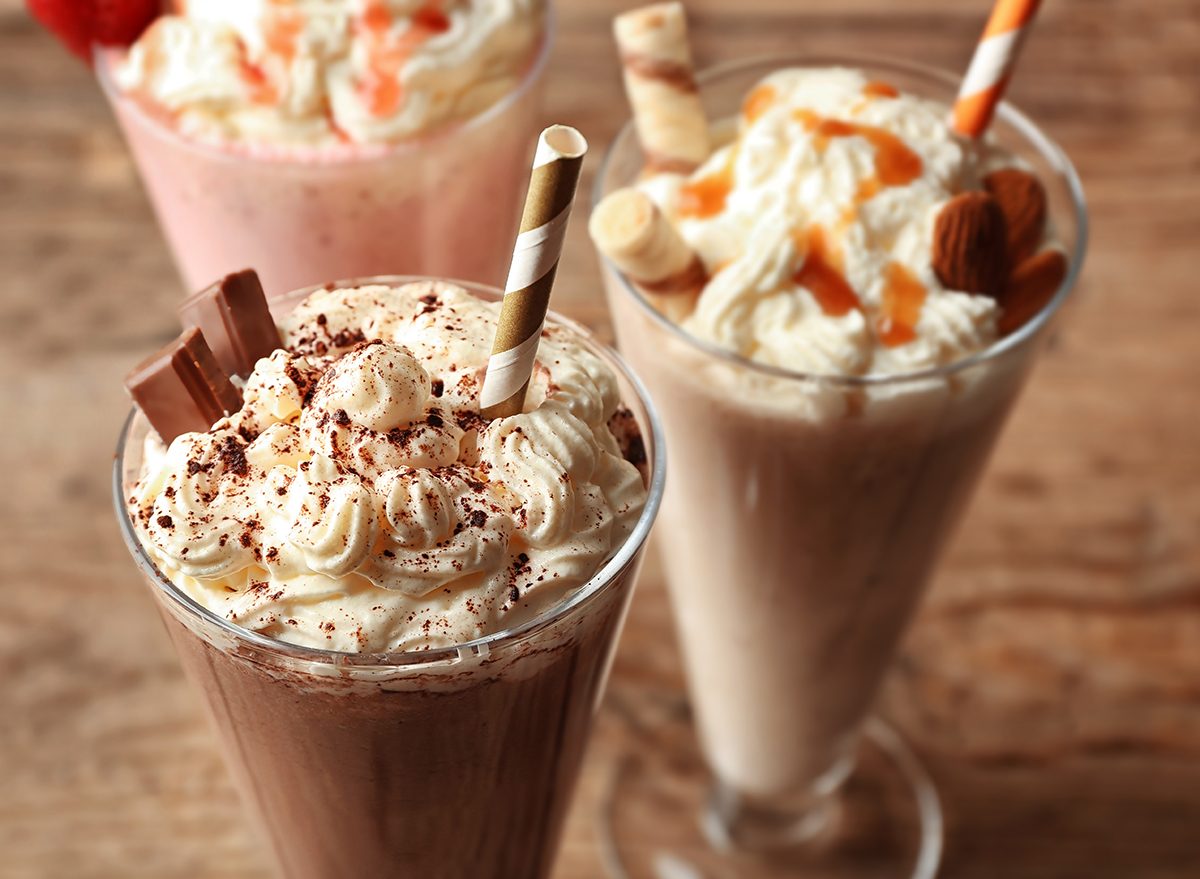
A long time ago, milkshakes had two ingredients: milk and ice cream. But as time went on, restaurants starting filling their shakes with everything from candy to chemicals, transforming them into potentially dangerous 1,000+ calorie concoctions! In fact, some of the lowest-cal milkshakes in restaurant land still have over 800 calories—in a small! If you want something cold and sweet, you're better off indulging in a scoop or two of actual ice cream or making a chocolate- or peanut butter-filled smoothie.
Conventional Bottled Nutrition Shakes
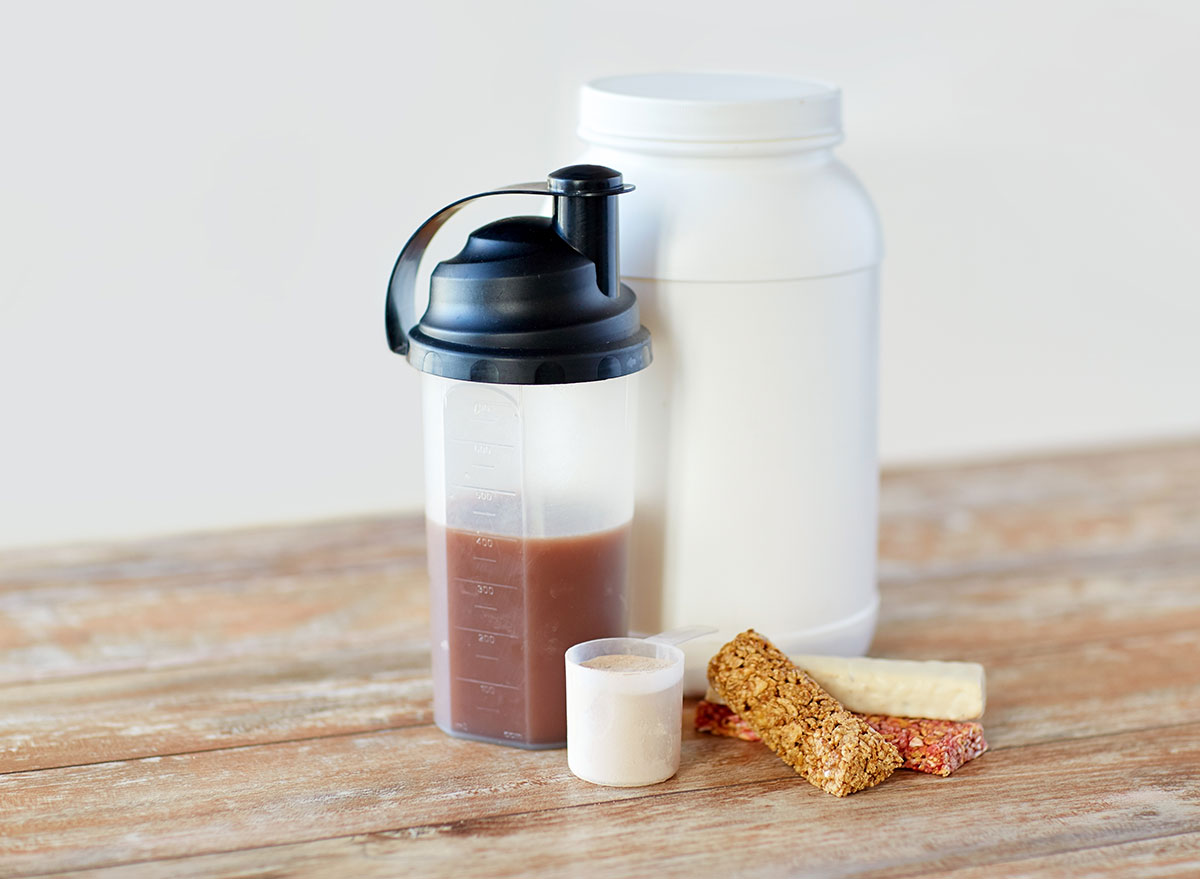
Are there grab-and-go protein shakes that contain no artificial sweeteners, high-fructose corn syrup, or hydrogenated oils? Sure! But the bulk of them are bad news for your body—despite the fact that are they are advertised as being the exact opposite. If they're not sugar mines, they're doused with artificial sugar and likely colored with carcinogen-containing chemicals, too.
Sweet Tea
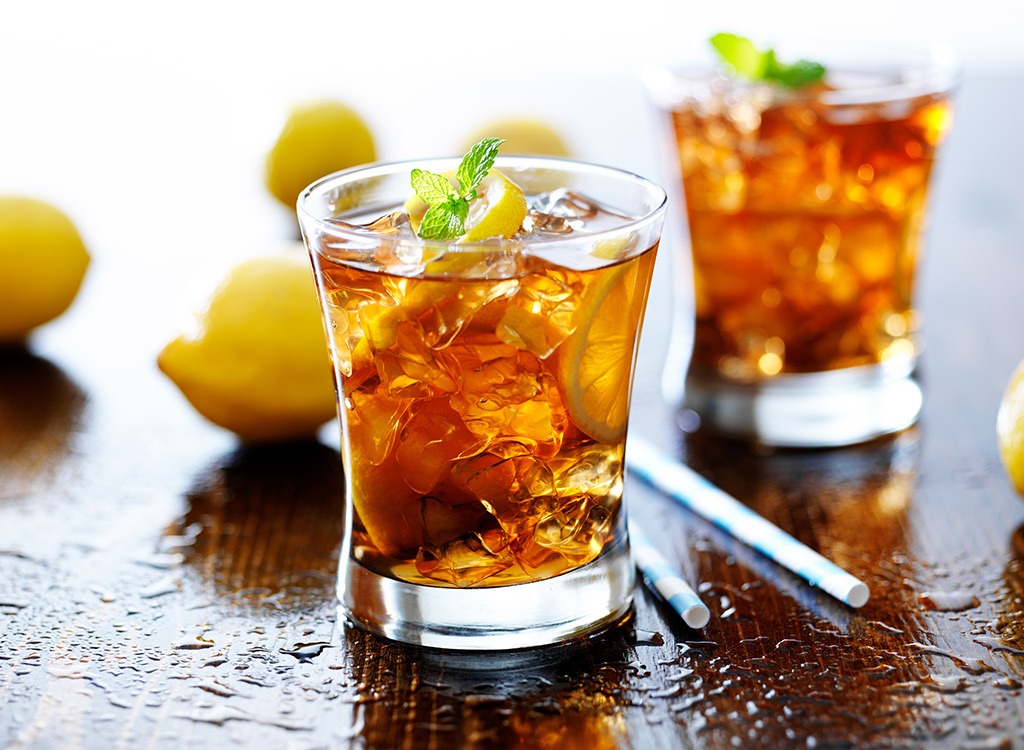
In case you're thinking that a glass of classic sweet tea is okay to sip on, it's best to keep in mind that it is, well, sweet. So that means there is a lot of sugar you don't need to be consuming. Opt for some water you add lemon or fruit to
No comments:
Post a Comment